

















The latest report from The Kings Fund shining a spotlight on the state of adult social care in the UK paints a stark picture of a sector under immense strain As highlighted in the Social Care 360 report while there has been a notable increase in social care applications there has been a worrying decline in the number of individuals actually receiving the care they need
This disconcerting trend underscores a systemic failure that successive governments have thus far been unable or perhaps unwilling to address It's evident that adult social care is facing unprecedented pressures with the report revealing a sector in crisis The lack of investment and meaningful reform over the years has led to a situation where the demand for care is constantly outstripping the available resources The consequences of this neglect are as industry leaders state dire impacting the quality of care provided and leaving vulnerable individuals without the support they require
As we approach a general election later this year, the issue of adult social care looms large, an "elephant in the room" that cannot be ignored any longer
Regardless of which party comes to power, they will inherit the responsibility to confront this pressing challenge head-on It s no longer acceptable to simply acknowledge reports highlighting the deficiencies in the system without taking decisive action
The next government must make adult social care a top priority committing to significant investment and comprehensive reforms Key areas such as recruitment and training must receive particular attention to ensure that the sector has the skilled workforce needed to meet the growing demand for care This requires not only financial investment but also a long-term strategy aimed at building a sustainable and resilient social care system that prioritizes the dignity and well-being of those in need
It s time for political leaders to demonstrate the courage and vision necessary to address the crisis in adult social care The welfare of some of the most vulnerable members of our society hangs in the balance and failure to act decisively is not an option The release of the Social Care 360 report should serve as a wake-up call for all stakeholders – the time for meaningful change is now
I would also take this opportunity to introduce you to our new recruitment website recruitment thecareruk com exclusively dedicated to adult social care recruitment
As a leading publication in the adult social care industry we understand the unique challenges faced by providers when it comes to recruitment That's why we've developed this specialized platform to offer a cost-effective solution for filling positions at every level within the sector
What sets us apart? Unlike generic recruitment websites, THE CARER's platform is tailored specifically to the adult social care sector This means that your job adverts won't get lost or diluted among listings from other industries such as retail, engineering, or hospitality With our targeted approach, you can rest assured that your vacancies will reach the right candidates who are passionate about making a difference in adult social care
Plus with both print and online job adverts available you can reach a diverse pool of talent across multiple channels so join us in revolutionizing the way recruitment is done in the adult social care sector Visit our website today at recruitment thecareruk com to learn more about how we can help you find the perfect candidates to join your team!

PUBLISHED BY
RBC Publishing Ltd
3 Carlton Mount
2 Cranborne Road
Bournemouth
Dorset BH2 5BR
TELEPHONE:
01202 552333
EMAIL:
sales@thecarer uk.com
WEBSITE:
www thecarer uk com
EDITOR
Peter Adams
SALES EXECUTIVES
Sylvia Mawson
David Bar tlett
Guy Stephenson
TYPESETTING & DESIGN
Matthew Noades
PRODUCTION & WEB ADMIN
Charlene Fox
Published by

(CONTINUED FROM FRONT COVER)
The report’s authors note that while the latest data does show a slight increase in the number of adults receiving publicly funded social care support compared to 2021/22 this upturn is likely largely due to a ‘correction’ after the extraordinary circumstances of the Covid-19 pandemic
Compared to 2015/16 there are still 11% more people asking for support and 2% fewer people receiving it
OVERSEAS STAFF
Equally although the number of social care vacancies fell from the historic high of 165,000 in 2021/22 to 152,000 in 2022/23, this was driven by a sharp increase in the number of overseas staff recruited to work in adult social care
Since then, the government has announced a tightening of the rules affecting overseas care workers meaning they will not be allowed to bring dependents with them to the UK
The report argues that, if the next government wants to fix’ social care it will need to increase funding to enable care providers to attract retain and train staff and implement reforms to make the system fairer and improve quality and outcomes for the users of services and their carers
REFORM “DODGED OR DELAYED”
Simon Bottery Senior Fellow at The King’s Fund and lead author said: For decades social care reform has been promised by governments but consistently dodged or delayed The latest figures make clear that the sector is showing little sign of improvement, leaving thousands of people without the support they need
There are severe financial pressures on local authorities who fund adult social care, and no sign that national government will step in to help Nor is there a credible longer-term plan to recruit and retain the staff needed
‘At a time when adult social care has never faced more profound problems with record numbers of people requesting support this is surely the time for the next government, whatever colour it may be, to make social care a priority
Professor Martin Green OBE Chief Executive of Care England said: “The Spring Budget was the Government’s last chance saloon to make good on their 5-year-old promise to fix social care The findings in this report show just how urgent government action truly is “Earlier this year, Care England and the national learning disability charity Hft found that unsustainable financial and workforce pressures are forcing adult social care providers to turn down new admissions
and close services, as government grants are not reaching the people who need them most
“The sector finds itself in a worsening crisis amid the Government’s narrative of ‘record investment’ into the sector The cost of providing care is rising the needs of the population are growing and the vacancy rate in the sector is at its second highest level ever ”
“Social care has become a political football leaving care providers and local authorities alike having to make difficult decisions about how to sustain care for those in need It is unclear just how many more reports it will take to spur the Government into action but it feels like time is running out ”
Steve Veevers CEO of Hft says: “This year s report paints a stark but realistic picture of the social care sector - one that continues to be affected by high vacancy rates, limited funding and a lack of action
The King s Fund is right to highlight the intense pressure our sector is under with adult requests for social care hitting a record high of two million
Our Sector Pulse Check report produced in partnership with Care England illustrates how this is reflected in the experiences of adult social care providers In 2023 43% of adult social care providers closed a part of their organisation or handed back contracts as a result of cost pressures ”
“This undeniably has a direct impact on those who draw upon support and without clear long-term funding will likely continue forcing care providers to make more tough decisions ”
The report also revealed that the social care workforce vacancy rate is at its second highest-ever level at 9 9% with a significant 6% gap between the rate for social care and the wider unemployment rate ”
This gap evidences that the social care workforce continues to be undervalued and underappreciated despite the vital work they carry out on a daily basis ”
From our own research we know that staff pay and poor perceptions of social care as a career are the two biggest barriers to recruitment and retention in our sector
To ensure our workforce get the credit they deserve and reduce the social care vacancy rate once and for all, we would like to see a longterm funding settlement with ringfenced funding for local authorities that enables them to pay the real cost of care including a wage for the workforce that mirrors the responsibility and importance of their role We continue to support sector-wide efforts to achieve this
“It is high time that the Government, and the next, addresses these challenges and invests in our invaluable sector Providers should no longer have to shoulder the financial burden of empty promises and
funding cuts and those who need support should not have to fight for it ”
llr Kaya Comer-Schwartz adult social care spokesperson for the Local Government Association said:
This important annual report highlight the perilous state of adult social care It is disappointing and concerning that the Budget provided no new money for these under pressure services despite an increased demand for them
“We need to see further urgent investment in adult social care and a boost to the workforce to ensure the best possible care for those that draw on it
UNISON head of social care Gavin Edwards said: Care has gone into a tailspin on this government s watch A litany of broken promises and a complete absence of action best sums up ministers’ appalling neglect of the sector
“Cash-strapped local authorities have been pushed ever closer to the edge by spiralling care costs
The blame for the crisis in care lies entirely with the government Ministers have failed to ensure council funding bears any relation to the harsh economic reality
“The sector simply doesn’t have the staff to meet growing demands Care workers are quitting for better-paid jobs on the high street, leaving employers increasingly reliant on staff from overseas
The next government must make care the priority it s never been Labour has promised a national care service and crucially a fair pay agreement in care
“Raising wages in this way won t solve all the sector’s problems But it will be an important first step that employers, staff and those being supported will all be able to get behind ”
The Department of Health and Social Care said it is “fully committed” to improving the social care system adding that it had made up to £8 6 billion in additional funding available this financial year and next
A spokesperson said: Additionally we are investing up to £700 million to accelerate digital transformation and rolling out digital care records, as well as funding home adaptations to help elderly and disabled people to be more independent at home
“We are also helping to attract and retain care workers including by supporting their career development through a range of new funded training schemes and for the first time a clear career path through a new accredited qualification


they are trying to solve by installing CCTV For example do they suspect a problem with carers behaviour is it to address demand by families of residents or is there another need for round-the-clock monitoring? Whatever the reason, the first step is getting a clear idea of the purpose CCTV would serve
Surveillance can intrude on people s privacy, and a care home operator will need to consider the rights (and potential concerns) of staff residents and visitors who may be captured by the cameras It must balance its duty to protect the rights of its ‘data subjects’ – the individuals whose data is being collected by the data controller – against its obligation towards the safety of its residents and staff
There may be other steps that can be taken first to mitigate any challenges faced in these areas But if they do decide there is a compelling case for installing CCTV – which should be backed up by very clear
reasons – then cameras may only be necessary in certain rooms such as those inhabited by highly vulnerable residents
Once an operator has made the decision to install CCTV, they must consider their obligations to comply with data protection law
Video surveillance is covered by the UK General Data Protection Regulation (UK GDPR) which concerns the handling of personal data
As CCTV footage of individuals can enable an identification of individuals it will fall under the UK GDPR The care home management, as surveillance operator, will be collecting personal data and must comply with GDPR as a data controller
When starting a project like this it is important to bake privacy by design into the early stages of the planning process This means understanding your obligations as set out in the UK GDPR
A Data Protection Impact Assessment which can be supported by law firms such as ours is a good starting point to identify and minimise the data protection risks of a project This will help ensure compliance with the data processing principles of fairness accountability transparency and respect for the rights of individuals and that you are clear on your lawful basis for processing the CCTV footage
There are other things that operators must think about For example organisations must tell people they may be recorded usually by displaying clearly visible signs as well as control who can see the recordings and make sure the system is only used for the purpose it is intended for
Data subjects can also ask to see the images recorded of them under subject access requests This is not a comprehensive list and there are other things to consider
The Care Quality Commission and Information Commissioner’s Office also provide CCTV guidance and checklists on their websites to help operators in navigating their legal obligations
Robust governance systems would need to be introduced along with any new surveillance system This should include policies and procedures for how data is handled, who can access it, how long it is stored for, and what would happen in the event of a data breach Staff will need to be trained on their obligations and this training will need to be kept up to date a challenge given the existing pressures on the care sector
There may also be employment law implications – for example whether existing contract terms include allowance for staff to be brought under surveillance, and considering amends to future contracts
More practically care homes should consider the impact of this on recruitment and retention which is already a significant challenge across the sector It is likely there may be some staff opposition to this type of project, so senior managers must be prepared for how they respond
Ultimately this is a balancing act between protecting residents staff third parties and indeed the care home operator itself With much to contemplate thinking everything through carefully and making adequate preparations to ensure compliance is vital should CCTV be installed



Team members from a dozen countries have helped a Winchester care home celebrate cultural diversity Colleagues from Europe, Africa and Asia partied with residents at
Care’s Abbotts Barton on a
The fun featured music dancing
Abbotts Barton Home Manager Dee Lovewell said: Our staff are of many
Across

and knowledge informed by their mix of backgrounds truly enriches our home and our standards of care for residents and their families
The day started with presentations from Poland and Ukraine followed by a gala display in the afternoon
“We had traditional music and dancing from Nepal and India and food from all nations to sample
“Residents toured the room looking at the displays for each country They even got up to dance with staff when we played traditional South African music
“Everyone was still buzzing from all the excitement the following day
One of those who attended George Smith said: The colours of the team s dresses were so vibrant and the styles unique
Fellow resident Mary Bulbeck said: I would be happy to do that all again next week!”



level
“However
“As the Unfair to Care report states 77% of MPs believe that the current rate of
is unfair With more than half of the population – 53% of people – stating that they will have a
view of political parties that address the issues of low pay the report argues that we are arriving at a moment where the public and politicians are increasingly aligned in the importance of addressing the challenges faced by care
The adult social care sector is very much regarded as an after-thought so we are calling for parity with the NHS, particularly in terms of pay, conditions and career progression There should also be clear recognition of how adult social care complements and enables the NHS to succeed Steve says




Conflict within the employment relationship can cause disruption growing beyond those involved and impacting the wider workforce Like a domino effect this can cascade into other areas of performance team morale and retention This is particularly difficult in a care setting, as conflict can cause severe disruption to the person being cared for and their family members Luckily, you can take steps to avoid this build-up and identify the conflict early
Conflict can be challenging to identify in the early stages as the employee can mask it Whilst you can t force employees to engage in sharing workplace feedback you can certainly take steps to manage expectations keep employees informed and identify and handle problems within the team before they escalate
The employment relationship can be complex so it is vital to get your employee relations right – particularly when considering the personal nature of a carer s role In order to set the foundations of a good employment relationship the following should be maintained:
Good communication
Proper training and guidance
Supervision
Regular team meetings
Maintaining good communication with your employees is essential to ensure that the ‘person-centred’ approach for the client is maintained whilst a continued awareness of boundaries and expectations is observed Employees should be told what their role entails and given the skills to undertake their jobs to the
standard you require and expect
In a care role offering the proper training and guidance is vital as this forms the foundation for the role Having offered training and communicated your understanding of the role the employer should consider how to supervise the care team on an ongoing basis including offering honest and constructive feedback regularly along with ongoing discussions around development and support From an employee’s perspective, supervision allows one-on-one time to provide feedback, discuss any issues and access support from a supervisor if needed
Team meetings are also a good tool to minimise workplace conflict as they help with team morale and encourage engagement between colleagues to solve problems This communication ensures positive engagement with employees and allows for productivity and continued working knowledge of how the person being cared for wishes to be supported
Additionally it is important for the employer to be alert to any issues within their team and take proportionate steps to remedy them In order to do this the employer should take all steps to maintain trust and confidence in the employee
If after taking these preventative steps, the conflict leads to an irrecoverable breakdown in the working relationship the employer should be well equipped to demonstrate that they have taken the steps expected and shown good practice as an employer to defend any subsequent claim Where preventative steps are too late the team are often divided and unsettled which can detract from the role that they are employed to undertake It is important to note that sometimes the likes and dislikes of the person being cared for change along with their views and wishes so if the situation isn’t working it isn’t always reflective of the performance of the employee Nevertheless it requires resolution If left unaddressed and unidentified this can itself turn into conflict that can impact the wider environment and unpicking a longstanding conflict can be tricky – but it’s not impossible!
Accessing impartial advice and guidance to prevent escalation of a workplace conflict can often be the most effective route to resolution It is recommended that employers and employees when in this situation obtain some professional advice to discuss the options available to them
In
MANAGING
Choose a
VERSATILE
From

We prioritise quality in equipment and services, ensuring reliability, durability, and high-performance for your culinary operations
With unparalleled experience we offer unwavering support dispatching engineers promptly in times of need backed by a service callout guarantee within 24 hours For further details or to schedule a site visit contact us at info@mk-hire co uk or dial 0345 812 0800 You can also visit our website www mk-hire co uk
See the advert on the facing page for details


•
•
•
•
•
•
•
•

People in adult social care and unpaid carers will benefit from a 20 million boost to fund innovative projects across the country as the government continues to deliver on its vision for social care reform
The Accelerating Reform Fund will expand community-based care models such as Shared Lives a service that matches people aged 16 and above with approved carers
Under this scheme people move in with their Shared Lives carer on a short- or long-term basis, giving people with care needs more freedom and autonomy and allowing them to live more independently in the community Short-term care through Shared Lives also supports unpaid carers by providing them with more flexibility and breaks
This week Minister Whately visited a Shared Lives home in Oxfordshire There the minister met and spoke with the Shared Lives carer and the three people who live with them in the home on a shortand long-term basis Minister Whately heard how Shared Lives is providing newfound freedom security and comfort
Minister for Social Care Helen Whately said: “Were sticking to our plan to deliver ambitious social care reforms that will ensure everyone gets the care they need and help even more people to live independently ”
Alongside our workforce reforms were supporting the sector by backing innovations which will make our care system fit for the future and provide vital support to our selfless unpaid carers
I ve seen first-hand how Shared Lives helps people who need care and Im delighted this funding will scale up support and make an even bigger difference for more people across the country
The funding will also develop innovations and digital tools focused on identifying and supporting unpaid carers For example:
Local authorities in Coventry and Warwickshire will expand a digital carers self-help tool to equip carers with the ability to identify local support and access bespoke information to support their own wellbeing
Local authorities in West Yorkshire will use the funding to connect hospitality tourism and leisure businesses with unpaid carers so they can donate holidays and experiences to carers to recognise their invaluable contribution to society
In Southwest London the funding will scale up approaches for identifying unpaid carers such as through hospital discharge programmes and referring them to carers networks
The Accelerating Reform Fund provides a total of 42 6 million over 2023/24 and 2024/25 to support innovation and initiatives in adult social care services across the country, focused on developing and scaling sustainable and effective types of support for people with care
needs
20 million is being allocated to lead local authorities covering all 42 Integrated Care Systems, which deliver adult social care services and will work with a range of partners including the NHS care providers voluntary and community groups 20 million is the first tranche of funding for 2023/24 The second tranche of the Accelerating Reform Fund 22 6 million will be allocated in 2024/25
Kathryn Smith, Chief Executive Officer of the Social Care Institute of Excellence said: Were excited about the opportunities offered by the Accelerating Reform Fund which is uniquely focused on innovation in social care Whether digital innovation or new ways to deliver support local people who draw on care and the millions of amazing unpaid carers delivering care around the clock stand to benefit significantly from the Fund
Its great to see the range of projects now emerging from local authorities working in partnership all over the country Were determined to support local leaders to find ways to overcome obstacles to innovation to improve lives
Kirsty McHugh Carers Trust CEO said: Carers Trust is pleased to
We
We
The
People
People
The

supports



General election candidates from all parties are being asked to support the creation of a new national care service in England
Trade union UNISON which currently has 1 3 million members wants to see a new service based on high quality care and a fairly rewarded workforce and while these changes are not expected happen overnight the union believes the reforms would put an end to 15-minute home care visits long waits for care packages
UNISON says too many people across the country cannot access the social care they desperately need because the current system is broken
A national care service would also mean the quality of care is of the same high standard no matter where in the country it was being provided, says UNISON Wages would also be boosted with a new fair pay agreement lifting care jobs off minimum wage rates and standardising salaries across England
This would allow care companies to start filling the huge 152,000 vacancies hole in the sector’s workforce, says UNISON
A national care service would also assist families trying to find out more about the level of care provision on offer
The union says that trying to navigate the current system to secure any kind of support can be confusing complicated and extremely stressful Labour has already pledged to create a national care service and a new fair pay agreement for care work-
government Shadow
Now the
secretary Wes Streeting was the first politician to show his support by signing UNISON s
is calling on every candidate who has been selected to stand in English parliamentary
seats at the next general election to sign up too
UNISON general secretary Christina McAnea said: “Social care is broken The current fragmented and privatised system is unfit to meet the needs of everyone who needs support But a better way is possible
Care workers are the beating heart of a system that should be able to look after everyone s loved ones with compassion and kindness But without the cash or sufficient staff the sector is struggling to deliver putting unbearable pressure on the NHS and families
“If the country is to have a care service of which it can be truly proud, care workers must be valued, recognised and rewarded as the skilled professionals they are
“That requires radical change Too many families are suffering because they can t access the support they need and because care isn t seen as the priority it should be by the current government
It s in everyone s best interest no matter how old they are that England has a national care service That s why it s so important for all the country s parliamentary candidates to publicly pledge their support
Supporting the call social care provider organisation the Independent Care Group (ICG) says its longstanding call for a National Care Service, with a mixed market of private sector and not-for-profit social care provision, is central to its own manifesto for the General Election
ICG Chair Mike Padgham said: “We have long campaigned for a National Care Service and support UNISON s call to get all prospective MPs behind the idea
The current system isn t working social care is in crisis with 1 6m people going without care 152 000 vacancies in the sector and providers closing or handing back delivery contracts
“A National Care Service supported by proper funding is the minimum we should be looking for from our politicians as they put together their manifestos for the General Election ”
A 103-year-old Woolmer Green care home resident has revealed her secret to living a long and happy life Marjorie Broadhurst from Care UK s Knebworth on London Road marked her 103rd birthday on 11th February Reflecting on her many happy years Marjorie shared that her motto for life is seeing my family grow as well as keeping busy in her younger years To mark the big day Marjorie s family joined her friends at the home for a special celebration and the team decorated the home with balloons and banners The home’s talented Head Chef also baked Marjorie a birthday cake Commenting on the occasion, Marjorie said “I enjoyed spending time with my family – I loved all the gifts cards flowers and chocolates I

received!
Daniel Grab, Home Manager at Knebworth, added: “Marjorie is a muchloved resident here at Knebworth and we all had a wonderful time celebrating her special day
We work hard to support residents to lead fulfilling lives and marking special occasions and birthdays plays a huge part in this We love any excuse to celebrate the amazing people living here at Knebworth and Marjorie s birthday was no exception Everyone had a wonderful time toasting Marjorie’s birthday and listening to her share memories from her long, happy life
“We’re all incredibly privileged to have Marjorie as part of the Knebworth family – happy birthday!


Working in end of life care is one of the most challenging, but also one of the most rewarding careers Hospice staff often develop strong relationships with the patients they care for getting to know what is important to them and helping them have the death they want
One of the biggest challenges hospice staff face is the grief that comes with losing a patient and having the strength and resilience to continue supporting other patients and their families
It is crucial that end of life care providers have the correct processes in place to support their staff as well as making sure new recruits are prepared for the challenges and rewards that end of life care brings
The most valuable asset a hospice has is its peoplethose who work and volunteer to support patients and their families, forming relationships with them and providing the best care possible
By Louise Sinclair, Chief Executive, Beaumond House Hospice Care (www beaumondhouse co uk)understands and has experienced the same emotions It is a common belief among hospice staff that caring for patients is an honour and a privilege and this feeling amongst colleagues can help staff to maintain compassion and the desire to continue doing the very best for other patients
Tackling misconceptions and recruitment issues
There are currently many misconceptions about working in hospice care - there is a big focus on the challenges but the rewards are often overlooked
To tackle this and encourage more people to consider a career in palliative care hospices need to do more to raise awareness of what they actually offer Many people see hospices purely as a place to die but in reality they offer so much more than this
Speaking to people who already work in hospice care can be insightful in helping others to recognise that we not only help people to die well but also support them to live well with their condition by planning ahead living a fulfilled life and enjoying time with people experiencing similar circumstances
That s why staff testimonials and case studies are such an important part of the recruitment process helping to showcase the benefits of a role in end of life care and why it is such a fulfilling and worthwhile career
Inviting people to get first-hand experience in a hospice care environment can help to tackle misconceptions too At Beaumond House we encourage students to undertake work experience and placements with us as well as inviting student nurses and paramedics to spend time with our staff both in the hospice and in the community We hold open days and events at the hospice so people interested in working in end of life care can see what a hospice is truly like
ensuring their symptoms are well managed or helping families have difficult conversations
It is incredibly important to follow someone s wishes at the end of life offering dignified care where people have choices and are in control of planning the care they receive For hospice staff, helping people have the death they want is paramount - whether this is dying in their place
Following the death of a patient, hospice staff are often comforted by the knowledge that they did their very best to help that person live well until they died Whilst it is vital that hospice staff have access to dedicated grief and loss support from their employer and colleagues having feedback from the family of patients can play a big part in helping staff to deal with their loss
Protecting your most valuable assets
Grief can have a huge emotional impact on hospice staff, and people at management level need to have the ability to recognise when it is affecting someone in the care team Each of us has a different way of coping with death and dying, so there should be a variety of ways to offer support and guidance to those who may need it
At Beaumond House we are a small organisation so it is often easier for us to see when someone is struggling and we encourage people to come forward and seek the support they need For example we hold after-death groups to provide a space for staff to talk about how they feel and more formally evaluate the areas where we can improve and provide better care
Many hospice staff also see great value in talking to their colleagues as it helps to talk to someone who
For staff working in end of life care for the first time it can be a scary and daunting experience to begin with Dealing with such a sensitive and emotional subject can leave people worrying about saying the wrong thing and upsetting a patient - or even not knowing what to say at all
Palliative care training helps staff to learn about the process of dying how to manage symptoms and the emotional and spiritual support that patients and their families need at such a difficult time
One of the best ways to provide this training is by allowing new staff to observe experienced colleagues, as well as providing specific communication training It is important to have clear, concise communication and to listen precisely to what patients’ wishes are, ensuring you clarify what has been said
New hospice staff should be informed about the support available to them following the death of a patient Experiencing this for the first time is inevitably very difficult, but teaching them how to balance loss alongside ways to express their emotions and feelings will help them develop a healthy response to death and dying
Although it can be difficult the rewards of working in a hospice setting far outweigh the challenges It provides a huge sense of purpose to enable communities to live well and die well and to provide personalised care for patients and their families when every moment matters
and Terry from The Parrett Community Shed for the first Beauchamp House Men’s Shed session, which
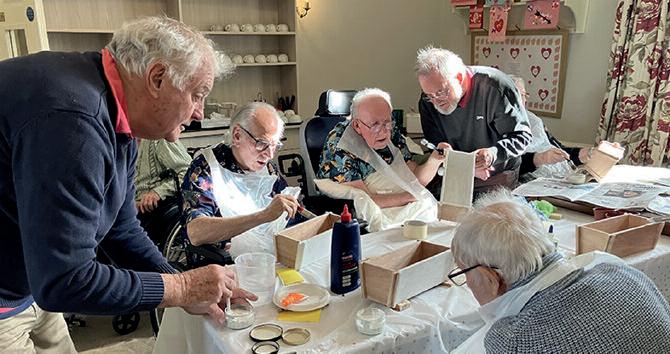
Chantal said “Through conversations with Chris to learn about his personal interests and hobbies, we heard how much he enjoyed being part of The Parrett Community Shed We wanted to start our own and were so pleased at the response we got from the other men who were excited to join in The first meeting was such a huge success as the residents were chatting singing telling jokes and having a laugh
She added: “One of our newest residents has been unsure about leaving his room and socialising with others since moving in so it was heartwarming to see that he was one of the first to arrive for the Men’s Shed meeting and made some new friends
Chris, the resident who helped to create the Men’s Shed, said: “It was so nice to get together with the other residents and lovely to

Almost all care homes forced to close by industry regulator the Care Quality Commission in England are run on a for-profit basis new analysis has revealed
The results led by researchers at the University of Oxford, funded by the Nuffield Foundation and published in The Lancet Healthy Longevity raise questions about the role of the private sector in exacerbating the care sector s ongoing crisis
The study assessed the number of care homes which had been forced to close by the independent regulator of health and social care in England the Care Quality Commission (CQC) This found that almost all involuntary closures since 2011 occurred in for-profit care homes: 804 out of 816 closures This translates into one in 30 for-profit care homes having been closed involuntarily by the CQC during this time
Co-author Dr Benjamin Goodair (Department of Social Policy and Intervention at the University of Oxford) said: Social care services in England are on a knife-edge of a crisis: underfunded understaffed and struggling to supply the quality of care deserved by the most vulnerable people in society However this new data challenges the assumption that these pressures can be eased by outsourcing more social care to the for-profit sector Instead, what is needed is a comprehensive assessment of the impact of for-profit provision on the quality and sustainability of adult social care in England ’
An involuntary closure is typically a last resort for care homes that have put their residents at risk or whose care services have continuously failed to meet industry standards However, 52 of the homes which had been forced to close had been rated as good during their last CQC inspection According to the researchers, this suggests that these homes posed urgent safety concerns with residents at acute risk of harm The researchers estimate that up to 20 000 residents were forced to relocate urgently due to enforced care home closures since 2011
The results are particularly concerning given the
increasing dominance of for-profit care homes in the sector according to the CQC data, in September 2023 more than 85% of all care homes in England were operated by for-profit providers; in 2011 the figure was 78%
Lead author Dr Anders Bach-Mortensen
(Associate Professor at Roskilde University and senior researcher at the Department of Social Policy and Intervention at the University of Oxford) said:
‘Involuntary closures are currently absent from the debate on outsourced care Although these are rare events enforced closures typically involve serious regulation and safety breaches that can inflict substantial costs to both the local authority and residents in need of relocation But most importantly the neglect leading up to an enforced and acute closure can be traumatic and harmful for residents To protect care users going forward it should be a priority to investigate if there are systematic reasons for why these enforcements occur almost exclusively in private for-profit provision
The new results reinforce the findings of previous studies which found that care homes operating on a for-profit basis tend to deliver poorer care than third and public sector providers
The analysis was based on data on enforced closures requested from the CQC and from the publicly available CQC data repository Registered charities council and NHS Trust care homes were considered as ‘not-for-profit’ or public, whilst all private companies partnerships and individual providers without a charity number were considered as for profit
The UK is currently in the grip of a ‘care crisis’ with public funding failing to keep pace with rising needs, a situation worsened by the continuing cost of living crisis and rises in inflation The CQC itself has raised concerns that the lack of a sustainable funding plan poses a serious risk to the sector and its most vulnerable residents In Scotland proposals to establish a ‘National Care Service’ – with adult social care overseen by regional boards rather than local authorities- have been pushed back to 2028-29








As a sector we ve always had challenges around hiring and the additional challenge of how then to keep good people Pressures in the shape of Brexit Covid-19 and the cost-of-living crisis have all had an effect on the sector and have contributed to the 152 000 vacancies - a 9 9% vacancy rate - and a turnover of 28 3%
Behind the stats are the human stories Every day millions of people rely on this care to support them and their loved ones and talented people face barriers to joining or staying in our sector – a sector that’s essential to the national purse contributing £50 3 billion to the UK economy As leaders its clear that the tried and tested ways of working aren’t fit for purpose anymore We need to start thinking beyond what we’ve done in the past so we can welcome more people into the sector and support them to stay One option, we re seeing more people turn to, is to recruit more overseas workers and thanks to a government fund this is now easier to do
In February 2022 the Government added care workers to the Shortage Occupation List That means nurses and carers from EU and non-EU countries can come to the UK if they meet certain criteria including: they have a job offer from a licenced sponsor they’ll earn £20 480 or more they’re 18 or over and have some experience of working in a care environment they can speak English well enough to do their job
As an employer you’ll need to apply for a sponsor licence from the Home Office which can take around eight weeks (though you can pay to fast-track it) The employer will have to pay a number of fees to sponsor a skilled worker visa, including the sponsor licence application fee It is also a good idea to consult a lawyer experienced in immigration matters when considering a skilled worker sponsorship license This can help ensure that you have a smooth and successful process, minimise the risk of unnecessary complications and help keep you up to date with any changes or updates to regulations For most
of us in this sector this is new to us so bringing in expert external advice is a must Being able to hire from abroad is one thing but the admin and logistics can be complex and time consuming So the Government has also set up a £15 million fund to support adult social care providers with things like finding overseas candidates applying for visas and helping people settle
The uptake has been significant From March 2022 to March 2023 around 70 000 people arrived in the UK and took up direct care provider roles up from 20 000 the year before The number of registered nurses with a nonEU nationality has risen from 20% to 26% in the same period And at Homes Together we are already benefiting from the scheme
Our 13 properties are home to more than 80 adults who rely on us for daily care We ve struggled to fill gaps in our team locally which has put pressure on our workforce - and made it harder for us to grow and support more adults
In 2023 we got a sponsor licence to recruit from overseas Since then we ve been able to welcome care workers from the Philippines on a three-year visa – so we can fill staff gaps support our teams and keep on giving people excellent care We ve been able to make the new recruits feel at home from day one with training homes to live in and colleagues ready to help them integrate into the local communities
Let s be clear, while this has been a huge positive it isn’t the miracle cure for all our sector’s recruitment woes We also need to double our efforts to drum up enthusiasm in the UK for social care work – and create conditions that help people stay in their chosen career For example attracting more people under 25 would help to really improve things At the moment just 8% of workers in our sector are under 25 - compared to 12% of the overall UK workforce Which means we re missing out on new ideas greater diversity and growing the UK talent pool for the long-term Work s underway to address this and other issues For example Skills for Care are working with
It s only by combining these home-grown initiatives with hiring talent from abroad that our sector will be able to bring down that vacancy rate and give people the careers and the care they so deserve
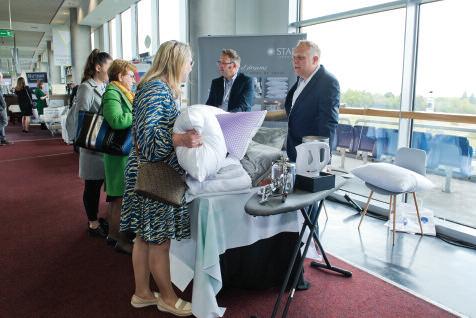
We look forward to seeing you there!
See the advert below for further details

A cross-party House of Lords scrutiny committee has raised concerns over restrictions to health and social care visas
The changes which came into force on 11 March include prohibiting health and care workers bringing dependants to the UK and narrowing visa eligibility from all posts in the care sector to only those where the sponsor is registered with the CQC
The Committee has called on the Government to provide more information about the effect of these changes which took effect in February 2024
The report comes after the Committee considered the Home Office’s latest Statement of Changes in Immigration Rules (HC 556) (the Statement)
The changes remove the provision for most dependants to accompany or join workers coming to the UK to work in the health and care sectors
The Statement also narrows the range of jobs in England for which migrant workers can be sponsored, reducing it from all posts in the care sector to only those where the sponsor is registered with the Care Quality Commission (CQC)
The Home Office told the Committee that the measures banning dependants from joining migrant workers would reduce the number of dependants coming to the UK by 120,000 per year but would have no effect on the numbers of workers themselves
The reasons provided by the Department to support this assertion included the fact that there was already a high level of global labour supply; that workers were seeking to come to the UK without their depen-
dants; and that there was a reduction in demand because of the CQC policy change However no evidence was provided by the Department in support of these claims
In addition the Home Office did not conduct a consultation before introducing these changes The lack of such a step meant that any benefits from gathering the views of those in the care sector and the general public as to the potential impact of the changes was lost
The Statement also includes a separate set of policies that alters the schemes that allow those fleeing the war in Ukraine to enter the UK These changes also suffered from poor supporting material meaning that explanations of the policy its context or its rationale were inadequate or unconvincing
Baroness Randerson Member of the Secondary Legislation
Scrutiny Committee said:
“We recognise that these changes are intended to address concerns about levels of legal migration However, there is alarm among social care providers about the impact of these changes: the care sector is already struggling to recruit sufficient workers and is worried these measures could make things worse
“The Government says that the dependant ban will not reduce the number of immigrant workers but it has not provided evidence to back this up This means it is impossible for Parliament to assess the effects of the changes properly and the
is also left in the dark
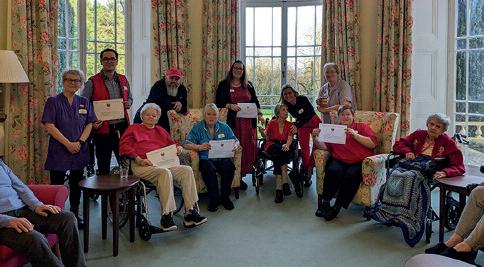
Whenever the Government lays legislation which has the potential to affect the effectiveness of a sector and has real world consequences for the public at large it must provide information on the impact This is a principle the Government has accepted but does not always observe in practice and we are writing to the Home Office to ask for further details
We will continue to highlight examples where departments fall short of their obligations to provide information to Parliament and the public thereby hindering our ability to effectively scrutinise secondary legislation”



In a 1990 Japanese study the authors discovered that simply looking at plants altered brain wave (EEG) patterns While observing plants, people also expressed less fear anger sadness and stress along with lower blood pressure, a slower heart rate and lowered muscular tension SEEING PLANTS THROUGH THE WINDOW SPEEDS RECOVERY AND LOWERS PAIN
In another 1984 hospital-based study, when patients could see plants and trees through the hospital windows they had a shorter hospital stay and needed less pain relief
VISITING GREEN SPACES LOWERS STRESS
In a 2021 Chinese study, the physiological and psychological responses of a group of young adults ages 22-28 visiting green spaces were recorded The Perceived Restorative Score (this measures being away from it all’) showed significant improvements in autonomic nerve function with less sweat gland activity reduced respiratory sensation and improved blood circulation The investigators emphasised the importance of visiting green spaces They recommended increasing the richness of plant species and water landscapes as a means of aiding stress recovery
LIVING NEAR GREEN SPACES IMPROVES MENTAL HEALTH
The Mental Health Foundation has commented on the fascinating link between access to green space such as fields forests parks and gardens and a reduced risk of mental health problems improved mood and increased life satisfaction ’
Deprived areas where there is little greenery or access to green space tend to have higher levels of men-

Elgar Court Care Home in Malvern, is providing a much-needed refreshment pit stop for all local emergency services with their “Take A Break” campaign At any time of the day hard-working emergency workers can call into the care home to get a hot or cold drink and a tasty bite to eat either to have at the Care home or, to take away with them if time is tight
The home said it is delighted to be able to offer this service to “our wonderful” emergency crews
 by Dr Deborah Lee, Dr Fox Online Pharmacy - https://www doctorfox co uk/
by Dr Deborah Lee, Dr Fox Online Pharmacy - https://www doctorfox co uk/
tal ill-health Indeed a 2021 systematic review suggests that those from lower socioeconomic groups benefit more from access to green spaces than those who are more advantaged
Trees and forests play a protective role in human health as they remove environmental pollution through their leaves A single maple tree removes 48 lb (22 kg) of particulates and 100 lb (45 kg) of carbon per year from the atmosphere It also removes toxic metals nitrogen oxides and sulphur dioxide There may be a link between dementia and exposure to environmental pollutants such as exhaust fumes
In a 2019 study 41 older people with an average age of 76 6 years were enrolled in a project to spend 20 minutes a day building a vegetable garden This involved digging planting, fertilising, and watering Blood samples were taken before and after the project There was a significant increase in brain-derived neurotrophic factor (BDNF), and platelet-derived growth factor (PDGF) after performing the gardening activity BDNF is important for brain function and memory PDGF is important for blood vessel formation and growth A 2016 meta-analysis of 22 case-control studies published since 2001, concluded a positive association between gardening and a wide range of health outcomes
It’s been estimated that a 10% increase in physical exercise would prevent 6000 deaths per year Doing more physical exercise is linked to a reduction in diagnoses of dementia mental health problems cardiovascular disease and cancer This does not need to be high-intensity exercise Gardening is a very realistic option to get people outdoors and moving more Gardening combines physical activity with being outdoors increases exposure to natural sunlight and can be a social activity Being outside in the sun has the benefit of lowering blood pressure and increasing levels of vitamin D
Investing in a garden in your care establishment can do wonders for your residents In some projects residents have been involved in planning digging and planting as well as setting up bird feeders for example Doing this may not be high on your priority list but we know that making the most of your outdoor space will do wonders for your resident s quality of life and well-being
- Are you making the most of your plants and green spaces?
- How could you improve exposure to plants and trees and the outdoor spaces for your residents?




Eating
– 75% of people experiencing a variety of symptoms These can range from difficulty containing or moving food and drink around in the mouth, to food or drink entering the airway (aspiration) which can be associated with pneumonia and, potentially, death
A common management option for people with difficulty swallowing drinks is the use of thickener These are usually gum or starch based and may be in powder or gel form The reason for their use is that if the drink is thicker it travels more slowly through the mouth and throat giving the person more time to trigger a swallow reducing the chance of it entering the open airway
Due to widespread concern about the overuse of thickened fluids the Royal College of Speech and Language Therapists (RCSLT) has created a position paper looking at the potential benefits and burdens of using thickener
There are two key benefits The first is that thickened fluids reduce drinks entering the airway and this is important as food or drink in
to chest infections and pneumonia The second
are
drinks
as aspiration pneumonia dehy-
or death Research has also found potential burdens associated with thickened drinks including thirst, dehydration, reduced quality of life, altered bowel movements, increased risk of respiratory tract infections if thickened drinks were aspirated and they may affect how some medications are adsorbed Most people prefer not having thickened fluids
In essence the research has left many uncertain about the role of thickened fluids in the management of swallowing difficulties
The RCSLT position paper highlights that thickened fluids are still a management option for people with swallowing difficulties However it also stresses the importance of a person-centred approach to its use Thickened fluids may be the most appropriate option for some people but the decision to use them should only be made after a thorough eating, drinking and swallowing assessment has been carried out by a dysphagia trained clinician – usually a speech and language therapist (SLT) Interventions to manage eating drinking and swallowing difficulties are wide-ranging and it is often a complex decision-making process with the person their family and care team to decide the most appropriate management plan This can include having smaller sips through specialist cups; changes to the positioning of the body and head during swallowing; or rehabilitation plans to improve swallowing
The RCSLT recommends that people on thickened fluids have long term follow-up appointments because of the potential burdens of treatment
As care providers you should consider your service users and their potential swallowing needs Running through the following checklist will help you to do this:
Is the person on thickened fluids and experiencing the potential burdens listed above?
If someone is having swallowing difficulties what steps have I taken to enable them to swallow more effectively? For example are they in an appropriate position; are they receiving regular good oral hygiene have I tried them with different cups to avoid tipping their head back?
• Does this person need to be seen by a dysphagia trained practitioner?
How can I communicate to my team that thickened fluids are not the only option to manage swallowing difficulties?
How can I advocate for my service users to have timely access to eating drinking and swallowing assessments?
The RCSLT has produced a useful information leaflet for people other than SLTs on the potential benefits and burdens of thickened fluids along with recommendations for usage As Swallowing Awareness Day (#SwallowAware2024) is fast approaching on the 13 March we encourage you to “think before you thicken ” and carefully consider people s swallowing needs and how they can be best supported
career they feel passionate about
course which included a week’s work experience at Pendine s Bryn Seiont Newydd in Caernarfon which specialises in dementia care Nicole has
She
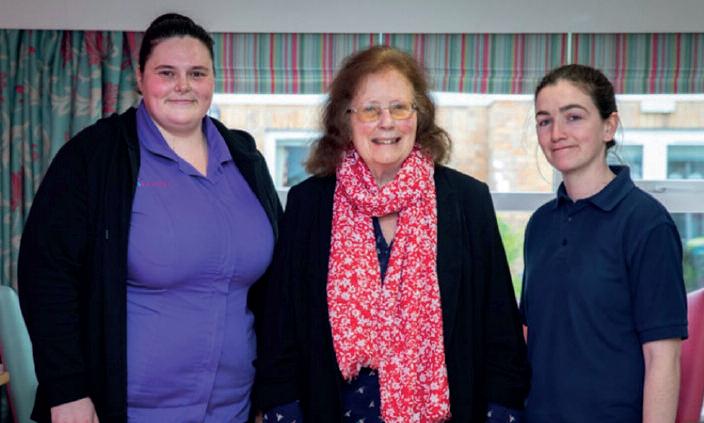
s Trust scheme has been inspiring and reminds us all that social care is a rewarding career where you can develop and progress
They ve been nurtured given great training and are doing an excellent job They came here on work experience and found a great
“It’s lovely to see young people flourishing and being so fulfilled ” Bryn Seiont Newydd manager Sandra Evans said Sioned and Nicole had “slotted perfectly” into the day-to-day life of the care home from the day they started
“We are very proud of both Sioned and Nicole The residents at Bryn Seiont Newydd have benefited from the efforts they have made to make the best of their careers They are excellent workers and as time has gone by, they have really blossomed and put in the effort to be promoted to the posts they hold here today
Pendine Park owner Mario Kreft MBE added the company are committed to supporting people of all ages coming to work in care and support the Prince s Trust and the ‘truth about youth’ project
Mr Kreft said: Of those taking part in The Prince s Trust scheme we have conversion rate of more than 50 per cent into employment and Nicole and Sioned are shining examples of what you can achieve They re great role models
We are very proud of the training and personal development programmes we have created It is something we have been doing for more than 20 years so we can provide high quality care, with the emphasis on the long-term wellbeing of our residents and staff
M-Resourcing are delighted to announce the appointment of Dan Ashenden to lead our M-Resourcing service with effect from 1 December 2023
M-Resourcing offers a multi-faceted approach to solving complexresourcing problems facing the care sector Whether you facespiralling staffing costs and pressures, or simply require a newapproach to managing this critical area for your organisation, ourcomprehensive resourcing solution reduces costs brings controland allows you to plan for the future with confidence
We knowfrom talking to our clients that managing their resourcing costs isstill a key priority and this important appointment underlines ourcontinuing commitment to the sector Christoph Marr CEO of Marr Procurement Dan is a highly-capable leader and has incredibly valuable experiencefrom his years in the care sector managing and delivering complex temporary labour

agency programmes We areexcited to bring that experience to our clients ”
Dan spent 6 years at Priory Group During my rewarding six-year tenure at Priory, I had the privilege of beingappointed as the inaugural UK Agency Manager where I honed my skills in enhancing their PSL offering Thisexperience has provided invaluable insights into the principles of effective temporary agency management reduction and control Now, as the Head of M-Resourcing at Marr Procurement I aim to leverage this knowledge tointroduce innovative strategies for temp agency reduction to benefit our clients My goal is to ensure the



A recent Freedom of Information Act request by the BBC found disrepair in NHS buildings Reported examples include parts of a ceiling collapsing in a clinical area and temperatures in an operating theatre reaching 29 degrees Celsius because of a broken air conditioning unit Other issues were also highlighted such as leaked sewage in a waiting area growth of green algae in a hydrotherapy pool and power being lost in an operating theatre
These examples were drawn from information provided by 86 NHS trusts which had responded from a total of 210 that had been contacted A key concern for all care providers is that disrepair and maintenance issues are impacting care provision According to NHS data the care of more than 2 600 acute hospital patients was disrupted last year by estates and infrastructure failures
Any instances of compromised patient care and people being put at risk by poorly maintained facilities can quickly cast a spotlight on the entire care sector Private care providers should take heed of this, especially now as organisations contend with potentially unsafe buildings caused by the historic use of Reinforced Autoclaved Aerated Concrete (RAAC)
DISREPAIR IMPACTING CARE
Fundamental standards outlined by the Care Quality Commission (CQC) cover the requirement for care providers to deliver person-centred care that meets the needs and preferences of people Alongside this standards also specify that individuals should not be given unsafe care or treatment or be put at risk of harm that could be avoided
The role – and expectation – of premises and equipment is also made clear by the CQC Its standards emphasise the need for places of care and treatment and equipment to be clean suitable and looked after properly The standards are a regulatory requirement under the Health and Social Care Act 2008 (Regulated Activities) Regulations 2014 and at the very minimum can be used by care providers as a check list for implementing and reviewing best practice
Regular inspections and testing of premises and equipment can help care providers to maintain satisfactory and savoury conditions for people This can be supported and formalised by policies that outline practical measures for the day-to-day running of premises It’s advisable that this approach covers processes for quickly identifying any problems with facilities and triggering rapid responses to mitigate the impact on care provision and recipients of care
Not all issues of disrepair and equipment failings can be fixed straight away Generally speaking this is understood by the Regulator and demonstrating how any problems will be quickly isolated to minimise possible risks of harm can help to avoid compliance failures Policies and plans can also outline acceptable periods of time for remediation of problems and short-term emergency measures further helping to fulfil regulatory requirements that relate to ‘premises and equipment and safe care and treatment
are a stark reminder for all care providers about the importance of maintaining satisfactory
Looking beyond the regulations that specifically cover safety and facilities care providers need to be mindful about how disrepair and maintenance issues impact upon care regulations covering ‘dignity and respect and person-centred care This is particularly pertinent as the presence of RAAC in structures can leave buildings unusable until deemed safe If this limits access to facilities disrupts routines and service provision or means that recipients of care must be moved it may compromise whether people are receiving the levels of care they actually need
As well as being safe and effective care provision must be compassionate and high-quality There may be instances where disrupted routines or moving people from familiar settings causes stress Similarly delays to treatment or uncertainly about when services are being provided may lead to anxiety
Levels of stress and anxiety can occur among both people in care as well as staff which risks further impeding levels of care provision It’s important that organisations are considering scenarios where premises and equipment may be inaccessible and have contingencies in place for minimising the potential impact on the people in their care
Widespread reports of the risks of RAAC and high-profile cases of disrepair whether in the public or private sector are likely to intensify the focus on the condition and quality of care facilities It may be prudent for providers to take proactive steps to review how person-centred their facilities and services are and ensure that they have the policies and practices in place to continually put people first despite any change in circumstances This could help to meet regulatory requirements and avoid complaints and claims while also enhancing the quality of care provision

experiences as part of quality care entrants are challenged to create an appealing and delicious two-course menu (main and dessert) appropriate for people in a care setting The combined food cost for both courses should be no more than £4 50 per head based on three portions and it must be nutritionally balanced The menu must also feature at least one product from Unilever Food Solutions sector-relevant catering range2
All paper entries will be judged by a professional judging panel and the successful chefs that make it through to the next stage will compete at the regional heats in June 2024 Here they will have 90 minutes to produce their dishes and demonstrate their skill set and knowledge under the watchful eyes of the competition judges The judges will be looking for clear nutritional understanding of the foods they are using and how they benefit the needs of their clientele plus culinary flair through flavours menu balance execution, presentation, and hygiene best practice
From their first operational centre in Hampton Hill Lura Care will be in a position to provide dental services to centres located in London, South East and part of East England
Lura Care, a company specialising in dental care services for care homes and day centres has opened its first operational centre in the United Kingdom in Hampton Hill London Their objective is to break the mobility barrier to care for dependent people or people with mobility problems who due to their condition cannot access the oral health services they need
Lura Care has developed an innovative model of mobile dental services that adapts to the specific needs of its patients whereby its specialised and highly skilled teams carry out the treatments on-site to avoid inconvenient transfers to clinics wherever possible
The highest-scoring competitors from each regional heat plus wild cards selected by the judges will compete for the title NACC Care Chef of the Year 2024 at the national finals on Tuesday 1st October at Loughborough College
Neel Radia National Chair of the NACC said I always look forward to this competition as it is one of the best opportunities of highlighting the fantastic skills of the innovative and creative chefs who find such job satisfaction working within the care sector It is also an inspiration to others who may be thinking of embarking on a worthwhile career in care catering
“Great dining experiences are at the heart of everything we do so there is no better occasion to showcase our talented chefs from around the country
“The competition will again be overseen by the amazing head judge, Steve Munkley, who provides constructive feedback after each regional heat That alone such be enough to encourage everyone to enter and celebrate the culinary excellence the care sector offers I wish anyone who enters the best of luck ”
Mr Paul Galpin Master of the Worshipful Company of Cooks said Once again the Worshipful Company of Cooks is proud to sponsor and be associated with the NACC competition For more than 500 years we have been involved in the world of cookery; initially being responsible for standards of catering and hygiene in the City of London and more recently closely engaged, through our support for competitions such as this one in encouraging chefs to achieve high standards that they can then take back into their workplace We are heartened to witness the year on year raising of standards and skills by the competitors
To all competitors we send our best wishes and we look forward to being able to host the winner at our annual Prize Winners’ Lunch when you will be able to sit back and enjoy the results of someone else’s hard work Good luck!”
For more information on the NACC Care Chef of the Year 2024 competition and to download the entry form go to https://www thenacc co uk/events/nacc-care-chef-of-the-year-2024

The company, who are registered with the Care Quality Commission, also carry out free, no-obligation initial assessments on-site to evaluate the oral health condition of residents and their dental care needs as well as training activities in care homes to help promote preventative health and healthy habits As a social impact company Lura Care is committed to advancing towards the Sustainable Development
Goals by promoting of good health and well-being (SDG 3) the reduction of inequalities (SDG 10) and the impulse of partnerships to achieve goals (SDG 17), as well as fighting the phenomenon of ageism that relegates millions of older people and restricts their rights to enjoy a full life with an optimal quality of life With this objective the company offers flexible and interest-free financing options for treatments so that no person is left without the care they need for financial reasons and reinvests a portion of the revenue back into the centres through bonuses to help improve their services
Founded in Barcelona, Spain, and also at present in Italy, Lura Care has provided their services to more than 1 000 care homes and day centres and has attended to more than 100,000 patients since the company was founded in 2015 From their first operational centre in Hampton Hill they will be in a position to provide dental services to centres located in London, South East and part of East England
Lura Care is registered with the Care


At Bupa Care Services providing Outstanding care to our residents is always our goal At each of our 120+ care homes and retirement villages our people work tirelessly to provide the best quality care for residents
To achieve an Outstanding CQC rating it requires continuous innovation 24/7 commitment and strong teamwork which together create magic! I always think you can feel an Outstanding home as soon as you walk through the door – there’s a wonderful warmth and buzz So how can we help our homes achieve this?
EMPOWERING PEOPLE
Providing Outstanding care to our residents starts with supporting our people to be at their best Careers in our sector can be hugely rewarding but they also need wellrounded support Caring for people s mental and physical health through tailor-made benefits schemes should be a priority, as well as supporting their financial health with schemes like transport loans early access to wages or financial advice
Setting Outstanding culture comes from the top It’s important to empower every person at the home whatever their role to deliver Outstanding care This means encouraging people to come forward with their ideas and a can do attitude to implementing new initiatives These don t need to be complicated every interaction with a resident can unlock something special Once the team starts to see the impact of Outstanding care on the residents the momentum builds
It s also important to reward people for delivering Outstanding care This can be vouchers, treats or parties to monthly awards that recognise individuals or whole teams for their Outstanding experiences A simple thank you in recognition of great work also goes a long way
PERSON-CENTRED CARE
When creating an Outstanding environment, delivering person-centred care, supporting independence and honouring choice should be the aim
This means getting to know our residents like friends and family and working closely with their loved ones to uncover their passions, history, life and personality outside of the home
Every day I hear wonderful examples of our people helping our residents live full lives This might be taking them to the pub garden centre or café to enjoy activities they ve always loved to creating a shoe shop for a resident who used to work in one organising a birthday message from Ed Sheeran for a super fan or becoming a Defra-registered home to keep pigs so that a lifelong farmer feels at home
SUPPORTED BY TECHNOLOGY
At Bupa we re undergoing an ambitious digital transformation driven by our people They told us that they wanted to spend their time caring By replacing time-consuming paperwork with digital notes that can be updated on the go, we’re freeing them up to deliver Outstanding care
Adoption of digital tools for care planning compliance and assurance underpins our ability to provide Outstanding care Technology gives us information about a resident s history medication or interests at the tap of a button and helps us communicate with relatives health professionals safeguarding and local authorities swiftly and easily It makes us agile in how we provide care, adapt to change and gather data so we can predict future needs
It also supports us in evidencing our Outstanding care to our regulators when it comes to inspections and to share learnings with our colleagues so that we can all improve
Sharing the caring
Once teams are in an Outstanding mindset they are constantly on the lookout for new ideas Again, technology can support with this On our intranet our 10 000 people share ideas and best practice and learn from each other It s wonderful to see them inspiring each other and it helps us all provide high quality care and experiences for our residents whichever home they re in
Sharing best practice more widely is also a key part of achieving an Outstanding rating, through contributing to scientific research And when it comes to inspections sharing learnings across homes can be really helpful so that everyone can benefit and consider where improvements could be made
Ultimately an Outstanding CQC rating is entirely reachable by working together to provide Outstanding care every day By helping our residents to live their best lives, our people thrive in their careers too
“I’ve Worked In Care For 20 Years - It's A Great Career Choice For The Younger Generation"
the different ways we can support our residents to live their lives to the fullest and getting to know them - everyone has a story to tell
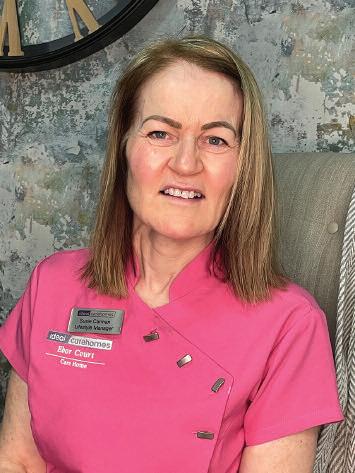
Look
job very much! I love exploring
Susie says When looking for care work many years ago there were a few points I kept in my mind to help me decide on the right role Obvious things like the working hours and the salary but questions like Will I feel confident to give the care required?’ and ‘Are there any training opportunities?’ were also important ”
“I would highly recommend a career in care to the younger generation – it’s such an important and rewarding sector and there are plenty of different opportunities to suit a range of people and skill sets ”
“After work experience in a daycare centre for the elderly I knew care was the job for me ”
Daryl James is a Care Assistant at Lime Trees in Shrewsbury After studying health and social care in college Daryl began working in care homes at the age of 18
I felt drawn to the care sector because it s so interesting Each resident has different needs, which you need to meet accordingly It means you’re constantly learning and your mind is always stimulated - no two days are the same!” Daryl says
“It’s important for people looking at a career in care to be good communicators to be patient and to be willing to learn adapt and have an open mind These people can really thrive in care work

Daryl suggests If you re thinking about working in care take the time to research and decide which areas of care interest you the most and consider how a path into these areas may look For example you may be able to take a course or do some work experience to help you develop the relevant skills “I didn’t set out for a career in care - now there’s nowhere else I’d want to be ” Prior to working as Front of House Manager at Newfield Lodge in Castleford Sasha Chappell was a PA for a global healthcare company Coming from a corporate world admin and customer service is my background and I use these skills daily in my current role with Ideal Carehomes
The customer service element of my role at Newfield Lodge is extremely different in comparison with other sectors At times you can be dealing with very sensitive situations and having compassion understanding and empathy for residents and their families is hugely important ”

“If you re prepared to work hard a career in care is for you It is an extremely rewarding sector and you leave feeling like you have achieved something at the end of the day Be prepared to fall in love with your work! You will be welcomed into a family that feels like your second home rather than a workplace
YOUR
Social

Social

Social care organisations have a lot on their plate, without a supply chain review getting in the way We collaborate with social care organisations and care homes across the country, taking care of the time-consuming details, and achieving the good value they deserve
With a robust, ethical, highly traceable supply chain, we deliver expert food, beverage, and non-food purchasing solutions that save time and money That means more time to focus on what matters, like supporting patient wellbeing with exceptional quality produce
Let's achieve new efficiencies today
Social care organisations choose us as their partner because we know the particular requirement of this challenging field We deliver a lean robust supply chain that works for your patients and people
In a busy market, we cut through the obscurity and complicated language to find the deals that matter to you, achieving the quality you deserve, at prices you didn't know were possible
How's that for a healthy supply chain?
We know how important sourcing is to social care organisations and care homes You need to know where your food, beverages and non-food are coming from, but that often means paying more than you should
At AVE, we don't believe that there should ever be a choice between ethics and value We offer sustainable sourcing that is good for the planet and your bottom line
Achieve lean robust food and non-food supply for your social care business or care home Our purchasing experts have spent years working in the social care sector identifying the particular needs of people in this challenging field and delivering on time every time Sustainable produce better prices and the quality you deserve
inspire healthcare chefs and catering staff with quality menus and recipes that your patients will love Our food management consultants have worked with health and social care organisations and care homes across the UK, crafting bespoke menus that deliver on price and taste We ll even help you navigate the tricky territory of special diets and allergens with ease
Catering can be tricky to go at alone Why not partner up? Trust us to lend a specialist hand across every aspect of your food operation, and guarantee the best results - safety and sustainability assured
lighted a range of issues around mental health care including inappropriate transfers and aftercare Six years on and the same failings around transfers and aftercare are still happening putting patients at risk
Ombudsman Rob Behrens said
The overwhelming majority of professionals in mental health services are hard-working and demonstrate their commitment and care on a daily basis However, the stories in our report show the human tragedies that happen when mistakes are made and how important it is for people to speak up and make complaints so that they don’t happen again
Delaying the transfer of someone out of hospital can cause harm but so can inappropriately discharging people too soon Too often the focus is on transferring patients out of inpatient services quickly No doubt this is at least partly due to the huge strain the NHS and mental health services are under But the priority must always be patient safety We know that unsafe transfers can have devastating consequences such as patients being stuck in a re-admission cycle and tragically suicide
and failures in their care
It highlights six cases involving failures in the planning, communication, or care of a person with a mental health condition being transferred from inpatient services or emergency departments back into the community
In 2018, PHSO published Maintaining Momentum: driving improvements in mental health care, which high-
We need to see a holistic joined-up person-centred approach Crucially patients their families and carers must be listened to and involved with decision-making
Mental health patients are among the most vulnerable in our society and I urge the Government to act on the recommendations in this report to keep them safe and prevent these same failures from happening again The lack of progress on the Mental Health Act is deeply disappointing we must see that strengthened and prioritised ”
As the world celebrated the joy of reading on World Book Day Chartwell House by Boutique Care Homes opened its doors to a heartwarming gathering of young and old alike Nestled in the picturesque town of Broadstairs Thanet this charming community hub welcomed visitors from near and far for a day of storytelling laughter and shared camaraderie
Ahead of the event the community rallied together to collect over 100 children’s books from generous donors in the area, ensuring that children who walked through the door would have a literary adventure awaiting them
The highlight of the day was undoubtedly the heartfelt exchanges between residents and their young visitors From sharing favourite stories to colouring in bookmarks together each moment was imbued with the magic of connection and shared experience Resident Gerald with a twinkle in his eye captivated the audience with tales from his beloved book Just William imparting wisdom and laughter in equal measure

Amidst the laughter and chatter the Chartwell House team added an extra touch of whimsy with their colourful costumes transforming into beloved book characters that delighted both young and old alike
From the mischievous antics of Where s Wally to the timeless elegance of Mary Poppins each costume was a testament to the enduring magic of storytelling
Another highlight of the day was when Jude Coveney Admissions Manager guided the children on a literary adventure through the pages of The Wonky Donkey Resident Patricia Sansby brimming with joy remarked “I thought it was a really special day!” Indeed World Book Day at Chartwell House was more than just an event – it was a celebration of community, connection, and the timeless joy of reading
As the day drew to a close and the children bid farewell, their hearts full of stories and their minds ablaze with imagination, the spirit of World Book Day lingered on at Chartwell House In a world where stories have the power to unite us all this annual celebration serves as a poignant reminder of the magic that lies within the pages of a good book and the bonds that connect us across generations
Diane Collins Home Manager of Chartwell House said: Today was about more than just books It was about fostering connections nurturing imaginations and celebrating the beauty of shared moments We are grateful to everyone who made this day possible and look forward to many more adventures in the pages that lie ahead

see other councils across London following suit However councils can t do it all by themselves, and greater investment in social care is required from central government A National Care Service would mean the quality of care is of the same high standard no matter where in the country it was being provided ”
The council is making good progress towards their commitment of having 100 per cent of care homes compliant with the charter by 2026
Out of 16 care homes in Southwark the six that have signed up are:
Bluegrove Greenhive Rosecourt and Waterside which are all run by Agincare
• Camberwell Lodge which is run by Country Court
Tower Bridge which is run by HC-One
work directly for the council or not
Cllr Evelyn Akoto Cabinet Member for Health and Wellbeing said: “We have been delighted by the brilliant response to our residential care charter so far The council cannot drive up standards of care alone So we are very proud of the amazing progress made so far thanks to everyone working together From the teams at all the six care homes signed up to the charter and their providers to council officers local partners and UNISON The people who look after our older loved ones do invaluable work on behalf of us all It is only right that they are better paid and better supported to provide the high quality care that residents deserve UNISON London regional secretary Jo Galloway said: “Southwark Council is setting a great example in adopting this residential care charter and committing to improving the working conditions of those in social care This will encourage dedicated staff to stay in their jobs benefitting local residents who will experience a better quality of care We hope to
Raina Summerson Chief Executive at Agincare said We are proud to be an early adopter of Southwark Council s Residential Care Charter as part of the transfer of care teams at the four care homes we operate in the borough The charter outlies the high standards of person-centred care that our care home residents can expect from our trained professional teams In return Agincare will continuously support and develop its team members to work towards their goals and aspirations for a long and successful career We continue to work closely with Southwark Council for a shared common goal that will improve the lives of care home residents and the people that support them
Jake Rollin, Director of Commissioned Care and Commercial Support at HC-One said: The social care workforce play such a vital role in supporting residents and their families We applaud Southwark













remains unconvinced whether government knows if it is achieving value for money from this additional funding and seeks assurance that funding for market sustainability and improvement has not instead ended up increasing profit margins for some providers
The PAC s inquiry challenged the Government on whether there would ever be a multi-year funding settlement that will allow local authorities to set out long-term programs to achieve the fundamental transformations needed in this sector Given it has a 10-year vision for adult social care reform the report urges the DHSC to set out how it will ensure more stable funding, and what it can do to give local authorities greater certainty to plan in the long-term
Dame Meg Hillier MP Chair of the Committee said:
“Years of fragmented funding and the absence of a clear roadmap has brought the adult social care sector to its knees Waiting lists are rising the sector is short tens of thousands of essential staff and local authority finances are being placed under an unsustainable amount of pressure
The decision to dedicate a single chapter in the Adult Social Care Reform White Paper to the social care workforce does not do justice to the level of work that will be required and feels to us like a bit of a cop-out While an NHS-style workforce strategy for social care may not be feasible the DHSC must set out how it will how it provide leadership across the sector to identify and address workforce challenges
local authorities supported more than one million people with care needs at a cost of £23 7 billion As at Autumn 2023 there were almost half a million people awaiting attention on their case and £2 7bn in additional funding was allocated in 2022 in response to emerging pressures However, the PAC
Whilst we welcome the increase in funding we fear this will do little to address the key challenges faced by the sector in the absence of a well-funded multi-year strategy A 10-year vision is all well and good but this alone is not enough to bring about the fundamental changes this sector so desperately needs ”
A Hampshire care home made a resident s heartfelt wish come true with a surprise opportunity to play the harp again for the first time in more than 60 years
Georgina Chesters a former member of the National Youth Orchestra said she was ‘absolutely astounded’ when a professional harpist arrived at Colten Care s Woodpeckers in Brockenhurst as a special birthday treat Liane Hopkins not only performed herself but brought along two traditional lever harps one big one smaller so Georgina could play too
Residents and staff, accompanied by Georgina’s visiting daughter Emma and granddaughter Eleanor watched as Liane spoke with the delighted 89year-old and invited her to pick one to try out
All eyes were on Georgina as gently and with a huge smile on her face she settled into position held one of the harps and began to let her fingers pluck and run across strings for the first time since her teenage years
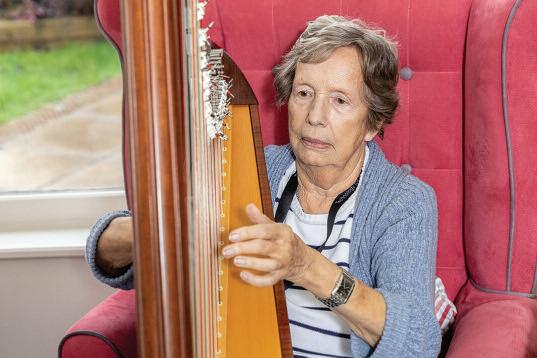
It was the first time that Emma a piano teacher had actually seen her mother play the harp even though she knew it was a big part of Georgina’s youth
Georgina said I was absolutely astounded by this surprise It was amazing I loved every minute of it Sian Harris, Companionship Team member, said: “Georgina has often spoken of her time as a harpist playing as part of the NYO
She has shared many stories including how she once left her harp on a railway platform and how she was too scared to tell her father but luckily it was returned in one piece
Over time she unfortunately stopped playing and has told us she ended up selling her harp to pay for a car
In all the time Georgina has spoken about playing the harp she has always said that she could never do it again as it’s so hard on your hands, but in January, as part of a reminiscing activity she actually said her wish was to play again even just one last time That was it I hit the ground running to make this wish come true ”
almost 16 years
As the General Manager of the Nursing and Residential Dementia care home she strives to inspire and support those she is working with and is passionate about mentoring and training which Mel says ‘reinforces the team s skills and ensures we are able to deliver the best possible person and relationship centred care ’
Since joining the home Mel has spearheaded various developments within the home including new Dementia Awareness Training and improvements to the home s two dementia communities which now boast Montessorithemed engagement areas throughout which appeal to residents’ individual strengths to encourage creativity independence and individuality
Through sharing her
While the rest of the home was sworn to secrecy Sian searched through social media for a harpist to come and visit, adding: “I thought it would be like finding a needle in a haystack so I was surprised when more than 30 people from all over Hampshire and as far afield as Somerset offered their services to come and play From that list I picked Liane Our staff and some of the residents knew about this special surprise for Georgina and everyone kept it a secret You could see by the smile on Georgina s face how much she was enjoying and appreciating it She was absolutely thrilled and overwhelmed when Liane invited her to play too She had tears in her eyes when we told her we had been planning that all along
Georgina tried both harps After half a century of not touching one it was a very moving moment when she started playing It sounded lovely, amazing ”
Born in Cardiff and now based in Romsey as a performer and teacher Liane has a repertoire ranging across all styles of music
She played to her Woodpeckers audience in the intimate relaxed setting of the home s lounge for more than an hour, performing pieces such as Somewhere Over the Rainbow, I Vow to Thee My Country and the Irish classic Danny Boy
The instruments she brought were a large lever Salvi Ana harp and a smaller lap harp made by Derwent Harps
Liane said: When I saw the home s plea for a local harpist to help fulfil a wish I messaged straight away offering my help Playing gives me so much joy and I love being able to pass on that joy of hearing and playing to others Woodpeckers are truly amazing by fulfilling people s wishes
“When I arrived, seeing Georgina’s face light up with surprise was amazing It was such a pleasure listening to her stories of when she played the harp and also hearing the questions the other residents were asking both Georgina and myself


Registrations are now open for Care Home Open Week (CHOW) 2024 which takes place from 24-30 June
The event will also repeat the Great British Care Cycle Relay covering 300 miles from Manchester to London Cyclists stop at care services along the way Each leg of the relay is around 20 miles and cyclists can complete as many legs as they wish
Registrations are open via the Championing Social Care website
The aim is to shine a positive light on the work of the care sector by encouraging homes to open their doors to the public, VIPs and local decision-makers
In 2023 over 5 000 care services registered to take part in Care Home Open Week That s around a third of the total number of homes in the country More than 150

With expert guidance from Barchester s Hospitality Development and Standards Manager Mervyn Knights 20 talented head chefs –the Class of 2023 – have just completed a year’s training and graduated from the Barchester Chef Academy
The Academy is the brainchild of Knights who joined Barchester 21 years ago as a Kitchen Assistant and worked his way up through the ranks to head chef and then to his current position as part of the team overseeing hospitality training across the whole of Barchester Along with the rest of the hospitality team it is Mervyn s job to ensure that the food being produced in all of Barchester’s 258 care homes and private hospitals for residents and patients meets Barchester s very high standards in terms of quality taste nutrition and presentation and that dishes are being prepared to the exact requirements of our individual residents

The Barchester Chef Academy helps chefs to both hone their skills and learn new ones, covering many different modules including cooking for residents living with dementia budgeting balancing flavours minimising wastage, presentation skills and so much more The 20 chefs who completed this year s course were full of praise for all they had learned; the chance to perfect new techniques and recipes share hints
and tips, to network and make new contacts and to expand their skill set Back in their divisions these chefs will help to train the hospitality teams in their sister homes
Speaking about the Academy s success Mervyn Knights commented: I am absolutely delighted at how well the Academy has been received by everyone who attended the course, it has been such a positive experience for all involved We have already started work with the Academy’s new Class of 2024 who are really enjoying the programme so far and who I know will go on to achieve great things
Dr Pete Calveley, CEO of Barchester Healthcare added “I am a huge fan of the Academy not least because I have had the pleasure of sampling some of the fantastic dishes produced by our talented chefs I am impressed by the high standard of cooking and by how beautifully everything is presented I am incredibly proud of all of the chefs that took part in the Academy this year, I know they produce wonderful food for our residents and patients cooked to their individual preferences every single day I am also exceptionally proud of Mervyn and all that he has achieved with the Academy it is a brilliant initiative and one that I know will go from strength to strength under his leadership

co uk/thecarer for further information







Grades 2 3 and 4 the
or
fully inflate and deflate around the pressure sore in dynamic alternating mode This action mimics residents’ natural sleep movements to optimise the flow of blood and air to the affected area The integral foam mattress can be stowed underneath the cells, if needed for Grades 3 and 4 to create a full mattress system with maximum therapeutic hyperaemia
Additional features include: ‘Auto Weight’ which automatically weighs the patient and adjusts pressure accordingly removing the need for manual intervention; Auto Upright which automatically optimises pressure when the patient is sitting up; and Auto Firm which adjusts the system to static maximum inflation to allow for nursing and care procedures Importantly there are no external pumps hanging from the bed that can hinder carers and an ultra-rapid CPR (cardiopulmonary resuscitation) valve readies the mattress for chest compressions To discover more about the Integra-Mat please visit: https://store blueleafcare com/product/pr766266integra-mat-auto-dynamic-mattress-system


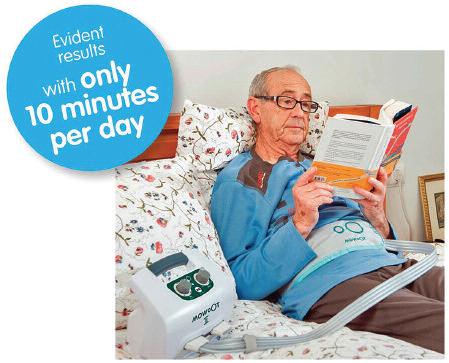

to compensate for rising costs and demand
Per-person spend on children’s services for the 37 councils in county areas has virtually doubled in the last decade – going from £88 per head in 2013/14 to £171 per person in 2023/24: a 93% increase This is higher than any other council type and the England average increase of 77%
Per-person spend on adult social care for the 37 councils in county areas which the CCN represents has increased by 50% over the last decade: going from £237 per person in 2013/14 to £357 per person in 2023/24 Taken together county and unitary councils are spending £202 more per person on these two care services as they were a decade ago
The 37 councils in England s county areas have on average budgeted to spend 69% of their entire budgets on just adult social care and children s services rising to 76% for some councils This average represents an increase from 63% a decade ago
where budgets are not protected will see a real terms reduction in funding from 2025/26 The CCN argues that councils will not be able to withstand another bout of funding reductions without fundamentally undermining the financial solvency of even the most well-run and efficient councils
The CCN is also warning that with demand showing no signs of abating there needs to be an honest discussion ahead of the general election with all main political parties as to what councils can be expected to deliver if local government is to face a further funding squeeze
The ten-year analysis of budgets reveals:
For councils across all of England with social care responsibilities both children s services and adult social care now consume 65% of a local authority s entire budget on average up from 57% in 2014 Taken together councils on average are spending £212 per head more on these services combined compared to a decade before
• Children’s services have witnessed the most dramatic rise in per person expenditure: from £120 per head in 2014 to £212 in 2024, a 77% rise With spending per person on adult social care also rising over the same period from £252 to £372, these two services alone account for 85% of the entire increase in per head spending on all council services Councils are spending significantly more on children’s services and adult social care because demand and costs have mushroomed between 2014 and 2024 with councils spending less on all other services as a consequence Alongside this government grant funding has largely been focused on those care services and there has been the introduction of social care council tax precept However these measures have been insufficient
Looking ahead with demand and costs projected to rise in both children’s and adults care services the proportion of councils’ budgets for all other services – including those that are highly valued and used by the majority of an area’s population – will continue to be squeezed The number of children in care has reached a record high, whilst the number of over 65s has risen 20% over the past decade
Alongside a discussion on what councils can reasonably be expected to deliver, the CCN is also calling on the next government to set out a comprehensive set of reforms which if implemented successfully could help address demand and costs in children’s services This includes reform of the marketplace in children’s services and a cap set on what private provide providers can charge for residential placements for children in care
Cllr Roger Gough CCN Spokesperson for Children s Services said:
This data brings to life the difficult decisions we all had to face when putting together our budgets this winter: what is left after spend for care services is factored in? These services are some of the most important we provide – they change peoples lives and they protect the most vulnerable in our society – but the fact remains they are not used by the majority of the population
“With more than two-thirds of the average county local authority’s budget now spent on just children’s services and adult social care, rising to three quarters in some areas, there is simply less and less each year for us to spend on highly valued services such as libraries, road repairs, and street lighting
“This month’s Budget confirmed that the public finances remain extremely tight Therefore we need to have an honest discussion with all main political parties as we head into the general election
In a fitting tribute this International Women's Day CHD Living a family-owned care group honoured the extraordinary women on its senior leadership team This celebration not only acknowledges their individual and collective contributions but also highlights the organisation s commitment to nurturing and advancing women s careers within the care sector
CHD Living s senior leadership team predominantly composed of women with decades of service showcases the dynamic career trajectories possible within the organisation These leaders exemplify loyalty innovation and compassion helping to drive CHD Living’s success
Nazira Hasham CEO and Founding Partner of CHD Living reflects on the organisation's journey and its vibrant culture of supporting women: "For over forty years, we have been committed to empowering women to excel and lead Our leadership team, made up of seven strong, independent females, many of whom began their careers in frontline positions, are a shining example of our dedication to professional development and equality Their journeys with CHD Living underscores the limitless opportunities for growth and the significant impact women can make in the care sector On this International Women s Day we celebrated their achievements and reaffirm our responsibility to fostering an inclusive and encouraging environment for all in our CHD family

Nazira s own story is one of resilience and pioneering spirit Migrating from Uganda as a refugee she transitioned from a pharmaceutical career to co-found CHD Living driven by a profound respect for elder care ingrained in her from a young age Over the years her expansive role ranging from direct care provision to strategic oversight reflects her unwavering commitment and passion for care – the very essence of what CHD Living stands for
Within the heart of the care group, there are many stories of growth and success, especially for the women who have shaped its legacy Each of them brings forth their unique narrative Becs Page's 15-year tenure at CHD Living exemplifies progression and opportunity Starting her journey as a Care Supervisor, Becs now heads up the quality assurance and compliance department, a role critical to maintaining the high standards of care CHD Living is known for Her story, from conducting audits to mentoring team members illustrates not just the scope of development at CHD Living but also the personal fulfilment it brings Becs advice to all the women out there Don t be defined by other people; you define yourself
Helen Aitchison who has worked with the organisation for over a decade has progressed through a
number of roles She is now part of the senior leadership team as Head of Communications and Transformation which is testament not only to Helen s hard work but CHD Living s ability to recognise and nurture talent Helen shared: I wouldn t say the organisation supports women differently to men but they re most certainly inclusive Senior management in the care sector is still heavily male dominated however CHD Living stands apart from this with a higher proportion of females sitting at senior management and board level This isn t something that has been purposefully structured it s happened organically and that is what is so special about this organisation ”
Nicole Fitzsimons went from Support Worker to Group Branch Manager for care at home She shared: “I have been provided with many openings throughout my career I have progressed through six roles within my 10 years at CHD Living and wouldn't be where I am today without the team here I have grown professionally and personally ”
Rebecca Connolly made a transition from the care at home sector and became Regional Manager for CHD Living's southern care homes She said "The organisation gave me the opportunity to take on a new role from home care to care homes I was guided through the entire transition and I receive regular training as well I ve even been able to start my Level 7 qualification in leadership and business
Tracy Lazell Regional Manager has a career in care and support spanning 33 years – starting out as a carer and working her way up to management and now one of CHD Living s Regional Manager s Highlighting the career of Shaleeza Hasham Commercial Director and a member of the founding family her story is a beacon of innovation and leadership Having officially worked at CHD Living for 15 years Shaleeza s journey from providing administrative and marketing and communications support to steering the organisation’s commercial strategies, demonstrates the breadth of opportunities at CHD Living Her achievements, including spearheading the Adopt a Grandparent charity and receiving numerous industry accolades, reflect CHD Living’s pioneering outlook and devotion to community service
Shaleeza said: “Working at CHD Living extends far beyond just a job – it is a lifestyle We are responsible for the wellbeing of so many people, our team members, our residents and their families and I
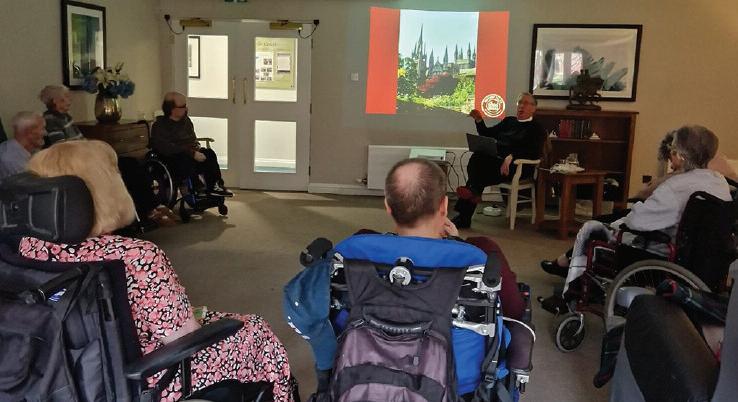









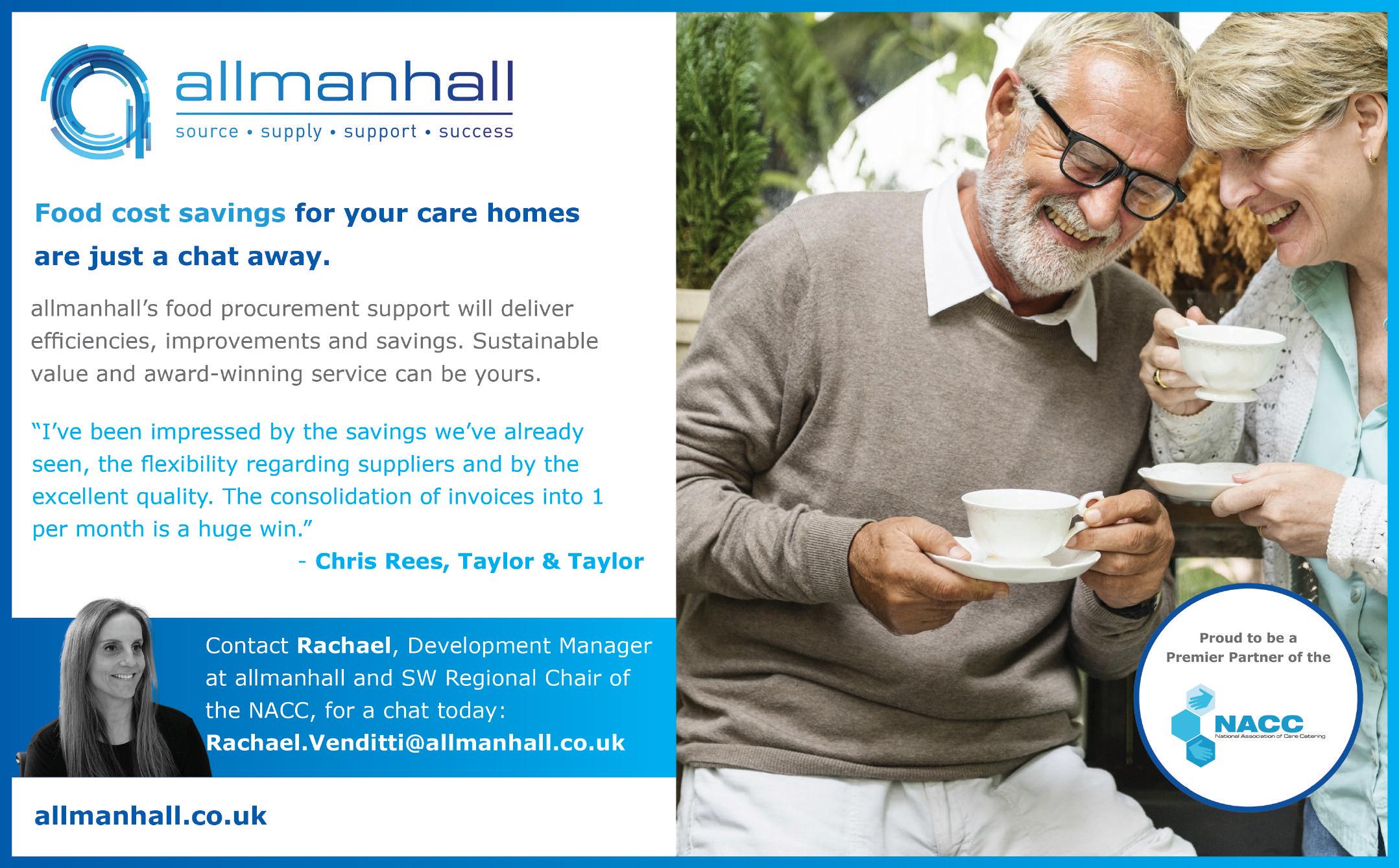

Triton has unveiled its new Omnicare Digital solution designed for safer showering in level access bathrooms


Expanding its industryleading collection of Omnicare electric care showers, the latest launch from Britain’s leading shower manufacturer has Bluetooth compatibility enabling it to automatically pair with a Whale Instant Match pump evacuating wastewater from showers where gravity cannot do so Ideal for both new build and retrofit applications the product joins Triton s existing Omnicare Omnicare Ultra and Omnicare Design products to form a complete range of inclusive thermostatic showering solutions
Packed







Offer chemical plans that cut the cost of bedpan washer/scale inhibitor and macerator disinfectant by up to 15%
Maintain all sluice machines not just their own models – cutting the cost of callouts and reducing the time spent waiting for engineers
Give you full visibility of the condition and requirements of all your sluice room assets 24/7 with a unique online portal This also reduces time spent on CQC compliance
Decades of experience tell us that the true cost of a machine breakdown averages £633 (assuming












Recreo VR headsets help improve the mental and social wellbeing of those you support with person-centered VR experiences Our fully managed service is a fun and exciting way to personalise care enhance activities and improve the quality of life of your residents
Our service has been designed for the care sector with
ories which are inspired by real experiences and are full of vibrant colours
Also a couple of our residents really enjoy tackling more challenging jigsaws I’m so impressed with how brilliantly they complete them; I certainly couldn t do as well as they do added Chelsey
“Puzzles are a very good pastime for our residents as they can improve mental speed and thought processes – and they are also a positive activity for improving short-term memory They can, of course be an individual activity but they are also a great group activity which creates opportunities for engaging with others chatting and conversations and making friends Daniel continued
Other benefits of puzzles include helping relaxation as by immersing yourself in a puzzle it can serve as an exercise in mindfulness and help to relieve stress For the elderly in particular the act of picking up puzzle pieces turning them over and fitting them together can sometimes but quite a challenge However puzzles are a great way to exercise the small muscles in fingers and eyes

“One of our residents told me that jigsaws can be traced back to the 18th Century when European map makers put their maps on to wood and cut them into small pieces They did this to create learning tools to teach geography – so really interactive puzzles have been around for quite a few hundred years Daniel continued I really do learn something new from our residents every day
“Our interactive Tiny Tablet is another example of our commitment to provide exceptional standards of quality care through person-centred care as all our residents can join in and take part in the group activities or use it on their own It’s up to them – they can do what they want to do when they want to do it ” Chelsey concluded For more information on the Tiny Tablet see the advert on the facing page


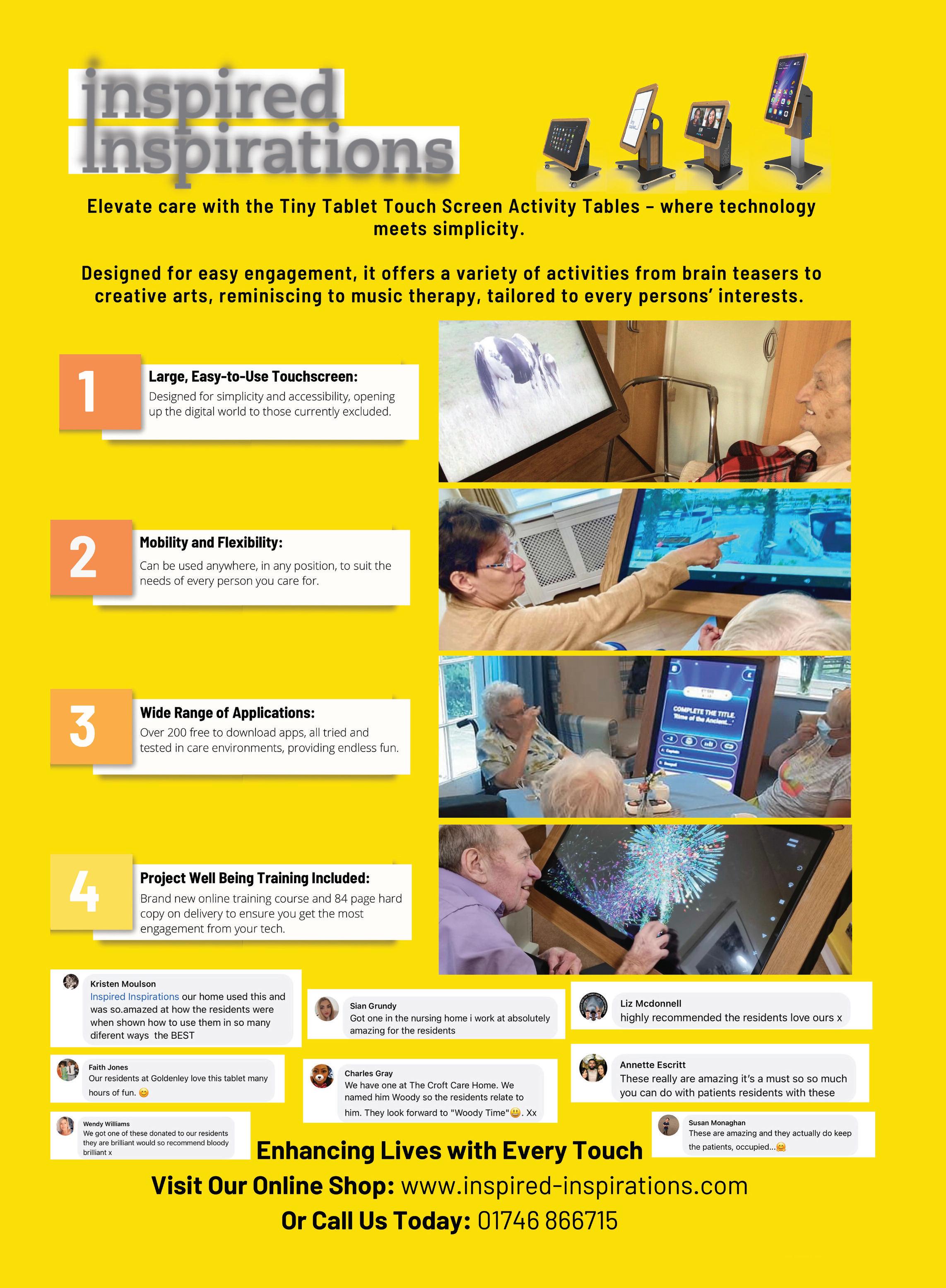

By 2030 one in six people in the world will be aged over 60 (including me!) The WHO now outlines loneliness as a key risk factor for the wellbeing of people in later life As a potential solution we’re increasingly seeing AI companions championed for being virtual friends who will listen and talk to individuals With loneliness and feelings of isolation rife amongst the elderly and vulnerable it begs the question: could AI chatbots be beneficial in care?
In short we would argue no Here s why
Complex issues such as loneliness cannot be solved by technology alone AI chatbots may seem like a promising solution but they cannot replace the human element of companionship and care that is so essential especially for those who are vulnerable and have complex needs Carers play a vital role in providing not only basic physical care but also emotional support and understanding This is especially important for individuals with disabilities who may feel isolated due to their condition or those with cognitive challenges and degenerative conditions such as Dementia
Chatbots are not suitable for everyone And in such cases human empathy is necessary to interpret the needs and communicate effectively with the patient
Empower carers and patients through technologies
The use of technologies such as AI in care must be evaluated to ensure it complements and enhances human connection rather than replacing it This means there must be careful consideration when proposing how to fit technology into the roles of those who may be the people patients see and talk to most as well as how it can be used to make the care journey better for patients
Although chatbots cannot replace human carers a combined approach of AI and other technologies can help care providers and facilitators
For example currently a typical caring schedule often includes three in-person visits per day for each patient However, due to time constraints, caregivers may have to rush these visits In this case, we would argue, that
technology can be used to allow carers to perform a more thorough in-person visit and follow up with two video check-ins based on the patient's needs (these video care calls can even of course be instigated from overseas)
Remote intelligent monitoring and predictive analytics can also be used by carers to capture an accurate overall picture of a patient s well-being to design better care programmes in advance rather than spending too much time during an in-person appointment on data capture
As well as improving patient-centricity, AI has the potential to streamline services for care facilitators by taking on mundane tasks and freeing up the caregiver's time and talent for creativity and innovation For example the administrative work involved in the daily operation of care providers and facilitators AI can handle emails user inquiries and information requests enabling users to access information quickly so management can focus on solving more complex issues efficiently
Ultimately the current care system is dealing with legacy and complex technology which has held back much-needed innovation While AI can be a potential solution many care providers see AI as a cost-cutting solution without first addressing the underlying issue of an inadequate care model
Digital transformation within the care sector should instead prioritise the needs of patients and carers rather than simply implementing technology for the sake of it Technology should add value to the care journey for example making it safer by vetting carers ID and training documents with banking-standard technology or reducing the time carers spend doing admin so they can focus on their vocation Similarly it should enable patients to access care easily and quickly so that they aren t stuck in the hospital and have better care outcomes
The successful implementation of AI in the care sector requires careful consideration of how it can meet the needs of patients And for that reason it’s not an effective way of combatting the loneliness of people in care AI cannot replace the crucial interpersonal relationships between carers and patients that build trust safety and companionship
However it can help ensure carers have more time to put the needs of patients at the heart of their work The key to successful AI implementation in the care sector is putting the patient first
Care UK s luxurious new Oat Hill Mews care home in Leicestershire gets the latest in Smart TV and digital signage technology from Boltonbased TVC Technology Solutions in time for its recent opening Oat Hill Mews is a stunning new development by Care UK offering the best in assisted living on-site care health and wellbeing for residents
Designed as a showcase of Care UK s portfolio the Market Harborough venue boasts luxury accommodation an on-site hair and beauty salon a dedicated café an on-site cinema multiple lounges and a fully equipped bar
To complete this high-tech luxury venue Care UK asked long-term audio visual and domestic appliance supplier partner TVC Technology Solutions to furnish the luxurious bedrooms resident common areas and cafes with the latest in Smart TV technology Maintaining the cutting-

edge theme Care UK wanted the latest in digital signage throughout the main areas enabling them to show various guest information restaurant menus and entertainment schedules
With Oat Hill Mews officially opening at the start of 2024 the complete AV and digital signage systems were specified installed and tested well in advance Early visitors have already been impressed by the neat hightech and luxurious feel of Oat Hill Mews from the reception area with its HD digital signage to every bedroom featuring a 43in Smart TV on either articulating or swivel wall brackets to provide the best viewing experience to its residents
Heading up the TV-technology TVC specified its own-brand Mitchell & Brown Smart TVs in 43in screen size for every room These fully featured Freeview Play catch-up TVs with all of the apps for streaming services such as Netflix Amazon Prime Disney+ and Apple TV offer Full HD picture quality and are backed by Mitchell & Brown’s UK-based customer help desk A key factor for Care UK in specifying Mitchell & Brown TVs was the brands famous seven-year warranty on every model in its range which has enabled it to become Britain s favourite UK TV brand
In the reception area, alongside a large Smart TV screen, TVC provided an industry-leading commercial digital signage media player with MySign content management software The system can be managed by staff at Oat Hill Mews to show a host of information including where residents are situated for their incoming guests display upcoming trips and events on-site staff and activities or simply display local weather and current events from around the world
MySign s cloud-based software has the functionality for members of staff at Oat Hill Mews and remotely from Care UK s main offices to easily schedule modify or update the content with minimal fuss As a default time-based templates provide information on meal times current and five-day weather forecasts
Comments TVC s Andy Greaves Sales Director With a longstanding relationship spanning over 15 years with Care UK the association trusts us to











Behaviour Smart is a behaviour support and incident recording system that produces accurate incident reports and smart behaviour plans that improve behaviour and consistency
10%

Be
5 Cavendish Road Sheffield S11 9BH 07498219287
info@behavioursmart.co.uk
www behavioursmart co uk
As a Behaviour Consultant I was frustrated with the inefficiency of behaviour incident recording in schools, children s homes and care settings The data collected was often filed away rarely analysed and only revisited in case of allegations Existing systems were not designed to improve behaviour
This led me to conceive Behaviour Smart a system designed to enhance behaviour management
However the high cost of software development deterred me Despite my wife s encouragement and discussions about re-mortgaging the house taking loans or seeking investors I decided against it
My wife believed in Behaviour Smart but in 2019 she unfortunately passed away from cancer She requested that I use the life insurance money to develop Behaviour Smart Honouring her wish I proceeded with the project
Behaviour Smart works by encouraging staff to
PASS supports over 1 000 care providers every day giving them access to market leading care management tools hand in hand with unlimited 24/7/365 support from our dedicated and friendly PASS team Assured by NHS Transformation Directorate PASS provides a secure platform that allows you to plan record and evidence the care you deliver The only assured solution built specifically for the home care sector, it provides comprehensive real-time functionality and allows you to share progress against outcomes with customisable, exportable reports
To meet the wider needs of the PASS community All-in-one PASS has recently been launched bringing advanced rostering functionality to our established digital care planning platform As a result advanced staff scheduling payroll and invoicing functionality is now seamlessly linked with care planning and reporting reducing the technical complexity risk and overhead associated with integrating two separate systems
As a result PASS now provides an all-in-one

reflect on incidents through structured reports It features a dedicated post-incident learning page which is based on extensive research to improve outcomes for individuals and staff It records not just the de-escalation techniques used, but also their effectiveness This data is exported to a welldesigned behaviour plan, or ‘Smart Plan Our customers have experienced significant reductions in behaviour incidents, with some reporting over an 80% reduction after using Behaviour Smart for just one year Dean Cotton, Director, Behaviour Smart info@behavioursmart co uk www behavioursmart co uk


Like it or not, financial accounting is crucial to the operations of your care home Without accurate reports, you cannot make proper forecasts, build accurate budgets, get paid on time by multiple funders and keep bed occupancy at optimal levels
Unfortunately, many care homes don’t have the time or budget to invest in powerful, care home accounting software This results in a vicious cycle where financial teams are so busy running manual tasks that they cannot take the time to improve their accounting systems, only to find each year they are farther and farther behind the technology their care home will need in order to thrive in the long term
Cloud Doing Good, a licensed partner of Oracle NetSuite, is here to stop that vicious cycle We believe care homes should have access to enterprise-level software without ballooning their budgets, so we donate the base software with up to three users to qualifying non-profit care homes
You know better than anyone that care home management is complex, and we know better than anyone that care home accounting gets complicated fast Balancing income for each resident from Councils, private sources, and family members requires detailed billing practices Add on top of that multiple legal entities, multiple care homes, the need for timely occupancy tracking and your finance team quickly becomes bogged down in repetitive, manual, and frustrating work
To make it worse, most accounting software are designed for slick enterprises (and priced for slick enterprise budgets) That leaves too many care home finance teams battling spreadsheets and duplicate reports to accomplish basic care home accounting tasks
Cloud Doing Good partners with care homes to
implement Oracle NetSuite’s enterprise-grade accounting software at as low a price as possible Here’s how Cloud Doing Good simplifies your care home’s accounting:
Pull all your financial data into a single platform Even with multiple legal entities, multiple care homes, complex billing structures, bed occupancy tracking, resident admissions and departures and additional unique needs, our system aggregates all the pieces of information into a single repository
Whether you need to get an overview of last year’s spending or forecast income, you can run the necessary reports in a matter of clicks This makes it simpler for your team to build forecasts, track spending, track bed occupancy and the financial implications in real time, and manage billing and collecting resident payments easily
When it comes to your financial systems, you need financial experts not call centre IT to set you up for success After all, with cloud software the IT should be pre-built and proven With pre-built base software, we

match our experienced system accountants with your project to make sure it reflects your accounts, your finances, and your people So you get not just powerful accounting software, but confident end users within as little as 15 chargeable days From the start of the project through your first month’s ends, you will have a team of system accountants on call to walk you through doing the day job on the new system
Cloud Doing Good’s mission is to bring streamlined accounting management to organisations that deserve it, so we keep it simple For qualifying non-profit care homes, we donate the base Oracle NetSuite software, including up to 3 users and unlimited UK entities This way, you can upgrade to enterprise-level accounting management without ballooning your budget

When you partner with Cloud Doing Good, you get access Oracle NetSuite’s award-winning accounting management software 25+ years of investment and trusted by over 1 million users, Oracle NetSuite safeguards your data in a cloud network with the latest security protocols and automatic updates to protect against breaches We’ll also integrate the platform into your existing data security structure for smooth, uninterrupted, and safe operations as needed This way, you can focus on your care and let us worry about cybersecurity Don’t risk your data and care home on a solution running small numbers of customers: Oracle NetSuite is powering 38,000+ organisations
We stand ready to simplify your care home’s accounting. Reach out to discuss your needs:
Iain Goldmann, Director iain@cloudoingood.com
Mobile: 447404354865
LinkedIN:
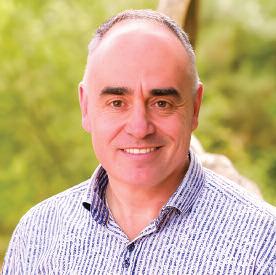
www linkedin com/in/iaingoldmann/


Curam (www curamcare com) the largest care worker marketplace and home-care technology platform in the UK today announces a strategic partnership with Doctify (www doctify com/uk) the leading global platform for patient reviews of health and social care, to power enhanced trust and transparency in the UK care sector through patient verified reviews when choosing carers
The partnership will address the critical need to improve patient experiences where only 14% of households are satisfied with care services
Providing more choice confidence and quality of care for patients and their families is therefore essential – and that s exactly the goal of the Curam and Doctify partnership
Doctify gives patients quick access to genuine independent and verified reviews of carers to find the best carer to suit their needs for at-home care These are anonymised based on the experiences of other patients and cover aspects such as the quality of specialists their services and treatments

Patients can then click through to Curam to connect with the carers with the expertise and availability that they need in real time Not only does this ensure that patients have complete control over their carer
also able to earn around 50% more than they would in traditional care agencies Patrick Wallace director of Curam said The cornerstone of care is the patient But the UK’s care sector currently doesn’t reflect that, with the demand for fast high-quality care far outweighing the supply We re on a mission to transform care into a sector that’s truly patient-centric and offers more rewarding careers for carers too With our partnership with Doctify we are providing even more transparency and confidence to patients and their families that they are receiving quality personalised care ”
Patient experience expectations continue to rise in the care sector The sector must prioritise trust and transparency by putting the patient at the centre We work with 32 000 healthcare providers to achieve this and are
to join forces with Curam Through our partnership, we ensure that
have
of
to meaningful feedback strengthening their understand-
needs and improving their experiences while patients can find


degree and developed a bespoke solution that delivers simplicity and ease of use coupled with speed, flexibility and accuracy – all in one outstanding application package

A new accredited qualification for care workers will help to improve perceptions of the sector and will boost retention
That s the opinion of a Lesley O Connor Head of Strategic Development at Realise a leading training provider which offers numerous qualifications in the sector
Lesley welcomed the Government s £75m investment to help people progress in their Heath & Social Care careers
The Government recently set out plans for a new accredited qualification and a national career structure for the adult social care workforce
It says the qualification will benefit around 37 000 workers within the sector while the defined career pathway will help people plan their future progression
But Lesley said while the funding package would make adult social care a more attractive proposition, it would likely only make a small differ-
ence to the 152 000 vacancies within the sector
This Government investment to add accreditation to the Level 2 Adult Social Care Certificate is very welcome and it will give the qualification additional value said Lesley
A clearly defined career pathway is also something I have championed for a long time and it offers people a clear route to progress their careers
It will also help to improve perceptions of adult social care as a whole People still think of adult social care as looking after old people and everything that goes with that but the opportunities are far more varied including helping young people with disabilities and assisting with treatment and recovery from addiction
“I hope it will encourage school leavers to consider adult social care as a viable skilled career with progression opportunities rather than a stopgap It will undoubtedly help to raise the profile of the sector and will give people with limited qualifications the chance to build their skills
“It’s well-known that people stay longer at places where training is available ” People in adult social care jobs will be able to enrol on the new Level 2
Adult Social Care Certificate qualification between June this year and March 2025
There will be other training initiatives available, including a new digital leadership qualification to help managers in the sector with the implementation of technology
But Lesley warned that this funding must be followed up with decisive Government action to plug the gap in care sector vacancies
She said “There is a bigger conversation to be had at a time when there are 152 000 vacancies within adult social care It is predicted we will need 440 000 care workers by 2035
“While this is a good starting point the Government must pledge future funding to support the long-term sustainability of the sector to attract many more people into roles at all levels If decisive action is not taken soon we could be facing unimaginable consequences over the next decade
Valuing the current workforce and giving them opportunities to upskill is important but ultimately pay and conditions need to improve to attract new blood into the sector rather than going into retail or hospitality
Realise is one of the country s leading training providers working with more than 1 000 employers and more than 10 000 learners a year throughout apprenticeships and adult education courses
For more information visit https://bit ly/realisetraining
will also complete reviews and ensure their policies and procedures remain up to date This way a provider not only ensures they remain compliant; they also benefit from best practice policies and procedures that provide a solid foundation for safe working practices and – ultimately – protect and support service users and staff

Ben Erskine – Director at W&P Compliance & Training www wandptraining co uk | Tel: 01305 767104 See the advert on page 2 for further information

At The Health & Safety Group, we understand that the process of getting your care workers through their Care Certification can be pretty demanding So we ve made it our mission is to make the training process as flexible and accessible as possible without increasing your costs or sacrificing the quality of our courses
We recognise that some prefer traditional classroom learning for the benefits of immediate instructor feedback hands-on skills practice and connecting with likeminded professionals
However if committing to fixed schedules and locations proves difficult staff may favour the unmatched flexibility of e-learning Our online courses allow caregivers to learn at their own pace, fitting training around their commitments while benefitting from rich multimedia resources
However you learn HSG offers the best of both worlds With classroom courses available nationwide 6 days a week we provide exceptional accessibility for face-to-face



















